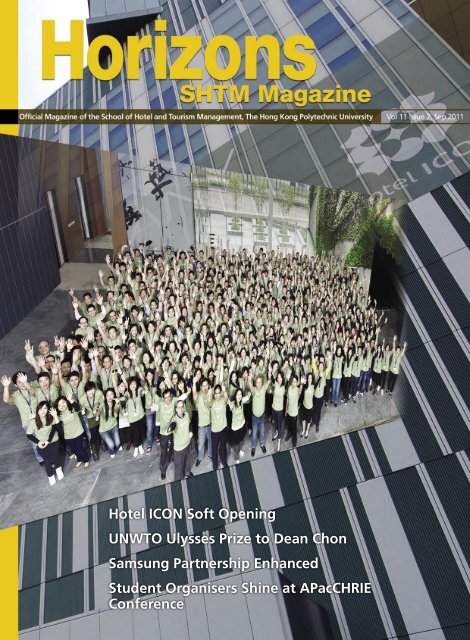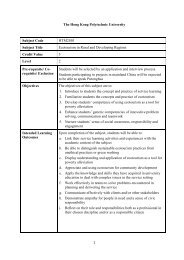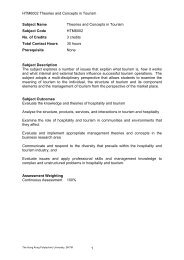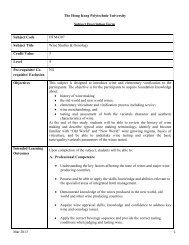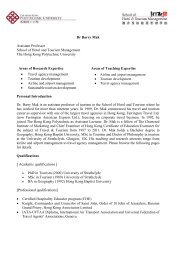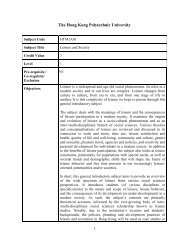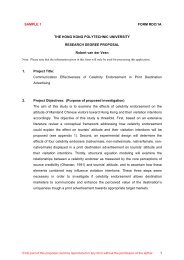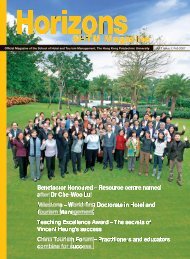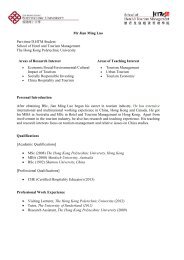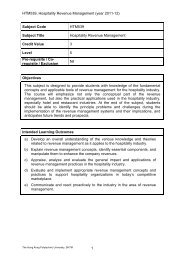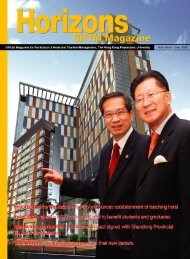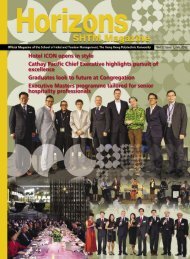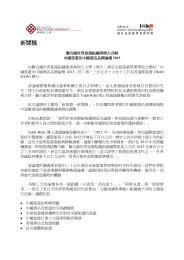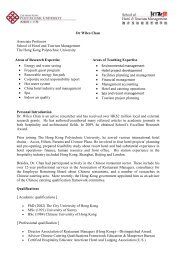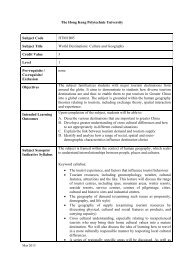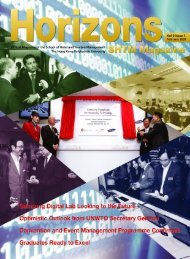Vol 11 Issue 2, September 2011 - School of Hotel & Tourism ...
Vol 11 Issue 2, September 2011 - School of Hotel & Tourism ...
Vol 11 Issue 2, September 2011 - School of Hotel & Tourism ...
You also want an ePaper? Increase the reach of your titles
YUMPU automatically turns print PDFs into web optimized ePapers that Google loves.
Celebrating <strong>Hotel</strong> ICON’s s<strong>of</strong>t openingContentsWhere Innovations in HospitalityEnrich World ExperiencesPublisher: Kaye ChonManaging Editor: Pauline NganConsulting Editor: AH EditingDesign: Creative PathPrinter: Impact Printing &Graphics Co. Ltd.Horizons is published by the <strong>School</strong><strong>of</strong> <strong>Hotel</strong> and <strong>Tourism</strong> Managementfor friends, alumni, staff andstudents <strong>of</strong> the <strong>School</strong>.Contributions from readers arewelcome in the form <strong>of</strong> articlesand photographs. All contributionsshould be sent to: Editor, Horizons,<strong>School</strong> <strong>of</strong> <strong>Hotel</strong> and <strong>Tourism</strong>Management, The Hong KongPolytechnic University, HungHom, Kowloon, Hong Kong SAR.The Editor reserves final editingrights on all material submitted forpublication.Telephone: (852) 3400 2634Fax: (852) 2356 1390Email: hmpn@polyu.edu.hkWebsite: www.polyu.edu.hk/htmMessage from Dean <strong>of</strong> <strong>School</strong> 2<strong>Hotel</strong> ICON Update 3S<strong>of</strong>t opening for one-<strong>of</strong>-a-kind hotelSamsung Digital Lab for Hospitality Technology 5New facility enhances partnershipUNWTO Ulysses Prize 7Prestigious award goes to SHTM Dean, Pr<strong>of</strong>essor Kaye ChonChina <strong>Hotel</strong> Brand Forum 8Focus on innovation at <strong>Hotel</strong> ICONAPacCHRIE Conference Success 10Students organise and run record-breaking conferenceUnderstanding Reached With Banyan Tree 12Memoranda foreshadow executive education and internship initiativesEquipment Donation to Laos 13<strong>School</strong> praised for social responsibilityLeading Alumni in a Global Society 14SHTM Alumni Association Honorary Chairman Wallace Li pr<strong>of</strong>iledNew Undergraduate Programmes 15Overview <strong>of</strong> the new four-year <strong>of</strong>feringsResearch HorizonsHighlights <strong>of</strong> staff research on developing effective tourism leadership, work-familybalance from the hotel General Manager’s perspective, customer perceptions <strong>of</strong>demand-driven pricing, interpreting the mindsets <strong>of</strong> multinational hotel investors,the bargaining behavior <strong>of</strong> tourists and implementing environmental managementsystems in small- and medium sized hotelsMainland China Programmes 18Seminar and Unity Dinner in HangzhouIn Brief 20News on SHTM activities, achievements and staff advancementStudent Activities 23Highlights <strong>of</strong> experiences overseas and closer to homeSHTM Students’ Association 25ACCESS executive committee inauguratedStudent Achievement Awards Awardees 26Achievers rewarded for academic excellenceMentorship Programme 20<strong>11</strong> 27Mentors and mentees set goalsAlumni Association 29Leadership renewed and achievements highlightedPr<strong>of</strong>essor for a Day Programme 31Thanks to our pr<strong>of</strong>essors for a dayUpcoming Events 33<strong>School</strong> <strong>of</strong> <strong>Hotel</strong> and <strong>Tourism</strong> Management
2Dean’s MessageMessage fromDean <strong>of</strong> <strong>School</strong>The SHTM has come a long way in the last 10 years, from ranking 15th among the world’shospitality and tourism programmes in 2002 to second in 2009, the leading producer <strong>of</strong>hospitality and tourism-related scholarship. With the s<strong>of</strong>t opening <strong>of</strong> <strong>Hotel</strong> ICON in Aprilthis year, we have firmly marked our place in the global elite <strong>of</strong> hospitality and tourism institutions,as described in this issue.We also cover the expanded Samsung Digital Lab for Hospitality Technology in our new premises, akey way in which we are staying at the cutting edge <strong>of</strong> technological innovation. <strong>Hotel</strong> ICON againfeatures when we turn to the recently held China <strong>Hotel</strong> Brand Development Forum, with our newteaching and research hotel held up as an exemplar <strong>of</strong> the sort <strong>of</strong> innovation under discussion bydelegates.On a personal note, I was humbled to receive the United Nations World <strong>Tourism</strong> OrganisationUlysses Prize in June. We cover the Prize in this issue because it is an important reminder that thewhole <strong>School</strong> should always be striving to fulfil its vision <strong>of</strong> leadership both at home and around theworld.That pursuit <strong>of</strong> excellence extends to students as well. Earlier in the year a group <strong>of</strong> conventionand exhibition management students organised and ran the 9 th APacCHRIE Conferenceat <strong>Hotel</strong> ICON. Their outstanding efforts attracted a record number <strong>of</strong> delegates, aswe describe in this issue.We also describe our new, more student-centric, four-year bachelor degree programmes,highlight the activities <strong>of</strong> students and staff alike, and present the results <strong>of</strong> our latestinvestigations in the Research Horizons section. Even as we reach new heights we neverforget what moved us here in the first place.Pr<strong>of</strong>essor Kaye ChonDean and Chair Pr<strong>of</strong>essor<strong>School</strong> <strong>of</strong> <strong>Hotel</strong> and <strong>Tourism</strong> ManagementThe Hong Kong Polytechnic UniversityHORIZONS
<strong>Hotel</strong> ICON Update3<strong>Hotel</strong> ICONLate April marked the latest phase <strong>of</strong> the SHTM’sascension to the forefront <strong>of</strong> global hospitalityand tourism education with the s<strong>of</strong>t opening <strong>of</strong><strong>Hotel</strong> ICON, the <strong>School</strong>’s groundbreaking teaching andresearch hotel. Wholly owned by PolyU and an extension<strong>of</strong> the SHTM, the hotel embodies the university’s credo <strong>of</strong>‘Where Innovation Meets Application’.Speaking at the cocktail party held to mark the s<strong>of</strong>topening, Chairman <strong>of</strong> the <strong>Hotel</strong> ICON board <strong>of</strong> directors,Mr Victor Lo, commented that “we have very highexpectations <strong>of</strong> the new development – we want it to takeSHTM to its next level <strong>of</strong> excellence”. PolyU President,S<strong>of</strong>t OpeningPr<strong>of</strong>essor Timothy W. Tong, noted that the excitementthe hotel had generated amongst university staff, alumniand students was matched by “endorsements from externalstakeholders, including hotel owners and operators, as wellas community leaders”.The s<strong>of</strong>t opening will take place in stages, with the firstcoming close behind the SHTM’s move into its newpremises. The entire complex now houses the SHTMpremises, university staff quarters, research and resourcecentres, faculty and administrative <strong>of</strong>fices, and <strong>Hotel</strong>ICON as an impressive addition to the Tsim Sha Tsui Eastskyline.SHTM Dean and Chair Pr<strong>of</strong>essor KayeChon strongly believes that the <strong>School</strong>’s neweducational approach, <strong>of</strong> which the hotel formsthe core, will <strong>of</strong>fer a balance <strong>of</strong> practical,conceptual and analytical skills that willbenefit from the integration <strong>of</strong> culturalelements in services management.From left: Mr Ron Chun, Mr Jung-ho Suh, Mr TaePark, Pr<strong>of</strong>essor Timothy Tong, PolyU President andPr<strong>of</strong>essor Kaye Chon, Dean and Chair Pr<strong>of</strong>essor <strong>of</strong> theSHTM<strong>School</strong> <strong>of</strong> <strong>Hotel</strong> and <strong>Tourism</strong> Management
4<strong>Hotel</strong> ICON UpdateDean Chon Highlights Unique ApproachAt the cocktail party marking <strong>Hotel</strong> ICON’s s<strong>of</strong>t opening,Dean Chon highlighted the SHTM’s unique approachto hospitality and tourism education. The following is acondensed version <strong>of</strong> his speech.Today, we are here to witness a very historicmoment in the development <strong>of</strong> the SHTM, whichhas grown from its very humble beginnings as asmall diploma-granting programme in 1979 to become one <strong>of</strong>the largest hospitality and tourism schools in Asia and amongstthe top such schools worldwide.SHTM students and faculty membersFrom the practical point <strong>of</strong> view, the first batch <strong>of</strong>student interns has begun work in Above & Beyond,<strong>Hotel</strong> ICON’s Chinese restaurant on the 28th floor,The Market buffet restaurant on the 2nd floor andGreen, the hotel’s spectacular garden-adorned lobbylounge.Meeting with General Manager, Mr Richard Hatter,and his hotel team at a tea reception during May, thestudents were very enthusiastic and looked impeccablypr<strong>of</strong>essional in their new uniforms. For them, theplacement experience will only be the start <strong>of</strong> thingsto come.SHTM student interns at <strong>Hotel</strong> ICON<strong>Hotel</strong> ICON is the world’s first teaching hotel <strong>of</strong> its kind.Although other universities have teaching hotels, our approachis unique. <strong>Hotel</strong> ICON is a purpose-built hotel that fullyintegrates teaching, learning and research in a full serviceenvironment. ‘Icon’ is very meaningful here, as the hotel is asignificant symbol for the future <strong>of</strong> hospitality education, thefuture <strong>of</strong> our industry and the future <strong>of</strong> our graduates.I <strong>of</strong>ten recite to myself Eleanor Roosevelt’s famous words at theend <strong>of</strong> WWII: “The future belongs to those who believe in thebeauty <strong>of</strong> their dreams”. Well, we had a dream. We believed inthe beauty <strong>of</strong> that dream, and we worked hard to realise it. Wehave come so far.In recent years, I have started using the term ‘Asian Wave’ toillustrate that the 21st century is the century <strong>of</strong> Asia for thehospitality and tourism industry. It follows the first and secondEuropean and American waves. There are both quantitativeand qualitative reasons to believe this. In 1999, the UNWTOforecast China to become the world’s No. 1 tourism destinationby 2020. The tourism community was a bit sceptical at first,but the prediction now looks set to come true even sooner than2020. As for Hong Kong, we had fewer than 6 million visitorarrivals in 2000, and last year we had more than 36 million!On the qualitative side, a simple look at a list <strong>of</strong> the world’stop hotels, airlines and airports indicates that a large majorityare in Asia. We believe our <strong>School</strong> is well positioned to lead thenew paradigm <strong>of</strong> hospitality and tourism education by takingpart in this new Asian Wave.We want students to use the new teaching and research facilities<strong>of</strong> <strong>Hotel</strong> ICON as a launch pad for their dreams. Our vision isto see them rise to become leaders <strong>of</strong> hotels, hospitality businessesand the tourism industry, not only in Hong Kong or mainlandChina, but also in New York, London and beyond.HORIZONS
Samsung Digital Lab for Hospitality Technology5The Samsung Digital Labfor Hospitality Technology<strong>of</strong>ficially opened by (fromleft): Pr<strong>of</strong>essor KayeChon, Dean and ChairPr<strong>of</strong>essor <strong>of</strong> the SHTM;Mr Terence Ronson,Managing Director <strong>of</strong>Pertlink; Mr Alex Chung,Chief Operating Officer<strong>of</strong> Samsung ElectronicsHong Kong Co Ltd; andPr<strong>of</strong>essor Timothy Tong,PolyU PresidentSamsung Digital Lab to BoostStudents’ TechnologicalKnow-HowMarch saw the <strong>of</strong>ficial opening <strong>of</strong> the expandedSamsung Digital Lab for HospitalityTechnology, as part <strong>of</strong> the SHTM’s newpremises in Tsim Sha Tsui East. Officiating at the openingceremony on 4 March were Mr Alex Chung, ChiefOperating Officer <strong>of</strong> Samsung Electronics Hong KongCo Ltd; Pr<strong>of</strong>essor Timothy W. Tong, PolyU President;Pr<strong>of</strong>essor Kaye Chon, Dean and Chair Pr<strong>of</strong>essor <strong>of</strong> theSHTM; and Mr Terence Ronson, Managing Director <strong>of</strong>Pertlink, a provider <strong>of</strong> technology solutions to the hotelindustry.Housing state-<strong>of</strong>-the-art computing facilities and specialists<strong>of</strong>tware for the tourism and hospitality sector, the lab joins<strong>Hotel</strong> ICON as one <strong>of</strong> the centrepieces <strong>of</strong> the SHTM’snew premises. Classes will be held regularly in the Lab, thefacilities <strong>of</strong> which will also be made available to participants<strong>of</strong> the Executive Development Programmes <strong>of</strong>fered by the<strong>School</strong>. The aim is to facilitate both learning and research.Thanking Samsung for thesponsorship that made thiseducation partnership possible,Pr<strong>of</strong>essor Tong said the Labwould “enable our studentsto keep abreast <strong>of</strong> the latesttechnology available in theindustry and enhance theircompetitive edge”, as well asprovide “fresh impetus to the SHTM’s ongoing efforts inthe advancement <strong>of</strong> education development”.The Samsung Digital Lab is home to a wide range <strong>of</strong>computing and audio-visual equipment, including 6715.6-inch widescreen notebooks, a number <strong>of</strong> 40-inch fullHD LCD iDTVs, four-in-one colour multi-functionallaser printers, projectors and Blu-ray players. All <strong>of</strong> theLab’s computers run advanced s<strong>of</strong>tware that supports theteaching <strong>of</strong> such subjects as Lodging Management, RevenueManagement, Financial Management, Convention andEvents Management, e-Business, Hospitality TechnologyManagement, and Data Analysis for the Hospitality and<strong>Tourism</strong> Industry.During the opening ceremony,Mr Chung <strong>of</strong> Samsung saidthat “the hospitality andtourism sector is a major pillar<strong>of</strong> Hong Kong’s economy”, andhe noted that the SHTM hasbeen “instrumental in nurturingyoung pr<strong>of</strong>essionals muchsought after by the industry”.In line with the two organisations’ “common vision <strong>of</strong>advancing educational development”, he said Samsungbelieves that the Lab “will bring long-term benefits tostudents by providing them with the opportunity to learnand apply the latest information technology in an industry<strong>School</strong> <strong>of</strong> <strong>Hotel</strong> and <strong>Tourism</strong> Management
6Samsung Digital Lab for Hospitality Technologysetting. We are privileged to be able to inject creativity intohospitality and tourism education”.Such industry support is clearly <strong>of</strong> vital importance as theSHTM opens this exciting new chapter in its developmentand aims to be a global symbol <strong>of</strong> excellence.New Facilities Showcased at SHTM OpenHouseCoinciding with the <strong>of</strong>ficial opening <strong>of</strong> the expanded Lab,the <strong>School</strong> held an Open House to introduce the assembledguests to the new SHTM premises. Guests also enjoyed acocktail reception at the <strong>School</strong>’s training restaurant, Bistro1979.From left: Pr<strong>of</strong>essor Kaye Chon; Mr Vincent Fung,Assistant Commissioner for <strong>Tourism</strong>; Mr GaryHarilela, Director <strong>of</strong> the Harilela Group; Pr<strong>of</strong>essorTimothy Tong; and Dr Ada Lo, SHTM AssistantPr<strong>of</strong>essorGuests exploring the new facilities during the Open House“With Asia emerging as the global centre <strong>of</strong> excellence inthe hospitality and tourism business, we see the need toadvance both education and research in hotel and tourismmanagement”, Dean Chon remarked during the OpenHouse. “As a purpose-driven school, we are constantlypushing into new areas. We are confident that the SHTM’snew education approach will help to improve hospitalityand tourism education everywhere”.The establishment <strong>of</strong> the new SHTM premises and <strong>Hotel</strong>ICON, which together make an impressive addition to theTsim Sha Tsui East skyline, is part <strong>of</strong> a unique PolyU projectboth to establish dedicated premises for the <strong>School</strong> andto cement its world leadership in hospitality and tourismeducation. The ultimate aim is to benefit Hong Kong, thewider region and the world.Dean Chon and his team were proud toshow <strong>of</strong>f the impressive 28-storey complexcomprising three main components: theSHTM home base, the <strong>Hotel</strong> ICONteaching and research hotel, which hadthe first phase <strong>of</strong> its s<strong>of</strong>t opening inApril, and the PolyU staff quarters. Inaddition to the Lab and various functionrooms, classrooms, and lectures halls, thecomplex is also home to the Che-wooLui <strong>Hotel</strong> and <strong>Tourism</strong> Resource Centre,Bistro 1979, and the Vinoteca Lab,where students will explore the secrets <strong>of</strong>viticulture and hold wine tastings.Pr<strong>of</strong>essor Chon introducing the new facilities to assembled guestsHORIZONS
UNWTO Ulysses Prize7Dean ChonAwarded PrestigiousUlysses PrizeAccolades always befit the leader and the SHTM’sDean and Chair Pr<strong>of</strong>essor Kaye Chon has receivedmany in an outstanding career. On 2 June hereceived the highest honour <strong>of</strong> all – the United NationsWorld <strong>Tourism</strong> Organisation (UNTWO) Ulysses Prize.Presented at the UNWTO Algarve Forum on <strong>Tourism</strong>and Science in Vilamoura, Portugal, the award is widelyconsidered the ‘Nobel Prize in <strong>Tourism</strong>’.Dean Chon is the first recipient <strong>of</strong> the Prize from the entireAsia-Pacific region. As a pioneer <strong>of</strong> tourism’s move into themainstream <strong>of</strong> academia he exemplifies the commitment toknowledge creation, dissemination and innovation that theUNWTO seeks to recognise.Typically humble, Dean Chon said that “it is a tremendouscompliment for me to be awarded the Ulysses Prize,” andrelated it to the bigger picture <strong>of</strong> what he is trying to achieve.“It has given me and my team at the SHTM strong impetusto further develop pr<strong>of</strong>essional education and research forthe fast-growing hotel and tourism industry in Hong Kong,the region and around the world”.Aside from his outstanding work in leading the SHTM tothe pinnacle <strong>of</strong> global hospitality and tourism teaching andresearch, Dean Chon has a long track record <strong>of</strong> developinghospitality education through his foresight and researchcontributions. He is past Chairman <strong>of</strong> the InternationalSociety <strong>of</strong> Travel and <strong>Tourism</strong> Educators and currentlyChairman <strong>of</strong> the Pacific Asia Travel Association’s Educationand Training Committee.Having risen to the position <strong>of</strong> Pr<strong>of</strong>essor at the University<strong>of</strong> Houston in the United States, Dean Chon came toHong Kong and joined the SHTM as Director in 2000,having since overseen the period <strong>of</strong> most rapid growth inits history. Fundamental to the creation <strong>of</strong> the <strong>School</strong>’s newvision for hospitality and tourism education with <strong>Hotel</strong>ICON at its centre, Dean Chon is himself a true symbol<strong>of</strong> excellence.<strong>School</strong> <strong>of</strong> <strong>Hotel</strong> and <strong>Tourism</strong> Management
China <strong>Hotel</strong> Brand Development Forum9<strong>of</strong> innovation and competition to the Group’s new Galaxy<strong>Hotel</strong> and Resort in Macau in a presentation entitled“Eclectic Mix <strong>of</strong> Oriental and Western Cultures Makes aWorld-class Brand”.Mr Xu Jinzhi, Vice Chairman<strong>of</strong> the China Tourist <strong>Hotel</strong>sAssociation, explained the newcriteria for the mainland’s hotelstar rating system, and Ms LilyNg, Executive Vice president<strong>of</strong> Jones Lang LaSalle <strong>Hotel</strong>s,spoke on “Brand Innovationsand the Developing Trends”.Other high-pr<strong>of</strong>ile participantsMr Xu Jinzhiincluded Mr Paul Foskey,Executive Vice President <strong>of</strong> Marriott International, andMr Nong Xia, Senior Vice President <strong>of</strong> Real Estate andDevelopment at Hyatt <strong>Hotel</strong>s, who served as panellistsin an Industry Leaders Roundtable that addressed thetheme “Focusing on the New Competitive Market– Creating a New Vision for 20<strong>11</strong> and Beyond”. HongKong <strong>Hotel</strong>s Association Executive Director Mr James Lutook up the role <strong>of</strong> moderatorin a Roundtable Discussion on“Brand Innovations – IntegratingDifferent Perspectives andDifferent Approaches”.Pr<strong>of</strong>essor Kaye ChonThe Forum’s final session movedbeyond China to focus on“Asianess in <strong>Hotel</strong> Leadership”,with panellists addressing howthe new Asian wave <strong>of</strong> hospitality leaders differ from theirWestern counterparts. A special feature <strong>of</strong> the sessionwas that the panel were entirely female executives fromHong Kong. They included MsAlison Yau, General Manager<strong>of</strong> Rhombus Fantasia Chengdu<strong>Hotel</strong>, Ms Katherine Wong,General Manager <strong>of</strong> Prince<strong>Hotel</strong>, Ms Gloria Chang,Director <strong>of</strong> Horwath AsiaPacific, and Ms Cheryl Yue,Sales and Marketing Director atW Hong Kong.“At a time when 90% <strong>of</strong> general managers in this industryare still men, here we have four highly successful Asianwomen who are industry leaders”, Dr Xiao said. “Wepurposefully invited them to talk about Asianess, Asianleadership and future trends and to hear their suggestionsfor our students.”The session moderators were Higher Diploma student MsAdriane Li and MSc student Ms Cecilia Xie, who werechosen by faculty recommendation. Despite some initialnervousness, the two really shone on the day. One <strong>of</strong> thepanellists was so impressed she extended a job <strong>of</strong>fer on thespot.The Forum successfully showcased not only the increasinglyinnovative nature <strong>of</strong> China’s hotel industry, but also <strong>Hotel</strong>ICON, the <strong>School</strong> as an outstanding hospitality educatorand SHTM students as future hospitality leaders.Mr James Lu, Executive Director <strong>of</strong> the Hong Kong <strong>Hotel</strong>s Association chairs a roundtable discussion atthe Forum<strong>School</strong> <strong>of</strong> <strong>Hotel</strong> and <strong>Tourism</strong> Management
10APacCHRIESHTM Students Provetheir Mettle at APacCHRIE 20<strong>11</strong>When SHTM Dean and Chair Pr<strong>of</strong>essor KayeChon founded the Asia-Pacific Council on<strong>Hotel</strong>, Restaurant and Institutional Education(APacCHRIE) nearly a decade ago, his vision was “to createa new paradigm for hospitality and tourism education”.That vision was surely realised this June when 30 <strong>of</strong> the<strong>School</strong>’s undergraduates organised the most successfulAPacCHRIE conference to date, attracting more than 500delegates from 37 countries.Held for the first time in its birthplace <strong>of</strong> Hong Kong, the9th APacCHRIE Conference, which adopted the theme“Hospitality and <strong>Tourism</strong> Education: From a Vision toan Icon”, ran from 2-5 June. It <strong>of</strong>fered the SHTM theopportunity to showcase not only the talent <strong>of</strong> its studentsbut also the innovative nature <strong>of</strong> its approach to hospitalityeducation and research, asreflected in the conferencevenue: <strong>Hotel</strong> ICON.As PolyU PresidentPr<strong>of</strong>essor Timothy Tongnoted in his openingaddress: “Our vision hasindeed been realised andtransformed into an icon”.The 30 students organisingthe conference – only thesecond undergraduateteam to do so in APacCHRIE’s history – were enrolledin elective courses Special Event Projects I and II taughtby Ms Chloe Lau, and divided into teams responsible forsponsorship, publicity, registration and hotel, tours, socialevents, the conference programme and the APacCHRIEYouth Conference 20<strong>11</strong>, which ran concurrently.Ms Lau said that in applying the experiential learningapproach to the two capstone subjects over the nine-monthperiod, she divided the learning outcomes into four areas:planning, implementation, modification and control. Thelatter two were particularly useful in equipping studentswith practical, real-life experience.“Modification <strong>of</strong> the original plan was inevitable, andcrisis management was another key learning outcome”,Ms Lau continued. “For instance, theoverwhelming response to the call forOfficiating at the Opening Ceremony <strong>of</strong> the9th APacCHRIE Conference (from left):Pr<strong>of</strong>essor Kaye Chon, Dean and ChairPr<strong>of</strong>essor <strong>of</strong> the SHTM; Pr<strong>of</strong>essor TimothyTong, PolyU President; Mr Stanley Yen,Chairman, Landis Management Co Ltd;Mr Anthony Lau, Executive Director, HongKong <strong>Tourism</strong> Board; Dr Andy Nazarechuk,Dean <strong>of</strong> the William F. Harrah College<strong>of</strong> <strong>Hotel</strong> Administration, University <strong>of</strong>Nevada Las Vegas (Singapore Campus); MsCynthia Deale, President <strong>of</strong> ICHRIE andPr<strong>of</strong>essor Manat Chaisawat, President <strong>of</strong>APacCHRIEHORIZONS
APacCHRIE<strong>11</strong>papers led to a major revision <strong>of</strong> the venue and programme plan”. A total <strong>of</strong>382 papers were received, with 223 presented during the conference, which alsoboasted 120 poster presentations. With regard to control, students had to find away <strong>of</strong> “optimising the publicity <strong>of</strong> the event with limited finances”, which alsorequired them to think on their feet and come up with creative solutions.The success <strong>of</strong> the project was also dependent upon choosing the right students.Prospective organisers underwent pre-semester interviews to ensure they hadthe right skill sets and level <strong>of</strong> commitment needed to see the project through.Teamwork, time management and communication proved essential skills.Third-year <strong>Tourism</strong> Management student Ms Catherine Wong, who was incharge <strong>of</strong> publicity, said the workload for her team was particularly heavy. Theyhad to produce real products throughout, the most challenging <strong>of</strong> which wasthe design and creation <strong>of</strong> the 4 x 8-metre conference backdrop. “Working onthe project stimulated my interest in event planning, marketing and designwork”, said Ms Wong, who has now graduated and hopes to make such workher career.The organising team comprised students from different years <strong>of</strong> study and arange <strong>of</strong> majors, including <strong>Hotel</strong> Management, <strong>Tourism</strong> Management, andConvention and Exhibition Management, with all praising the project forequipping them with career-related skills. “We got insights into reality”, saidGigi Wong <strong>of</strong> the registration team. “We had to deal with a real client, realsuppliers and real guests. It was a valuable experience”.In his keynote address, Dean Chon emphasised the need to “co-create value withour stakeholders”: the industry, students and faculty. Having students organiseprestigious conferences such as APacCHRIE is certainly one way <strong>of</strong> doing sowhile providing “an important learning experience: a lesson in creativity”.Keynote Speaker Mr Stanley Yen surely had such educational innovation inmind when he called on tourism and hospitality educators to equip studentsnot only with book learning but also with practical experience and a passionfor sharing.ConferenceKey FactsThe Event• 9th APacCHRIE Conference• 2nd APacCHRIE YouthConference• 1st time held in <strong>Hotel</strong> ICONTiming and Highlights• 4-day conference• 44 conference hours• 3 major social functionsOrganisers• 30 Organising CommitteeMembers• <strong>11</strong>2 volunteersDelegates• Delegates from 37 countries• Over 500 delegates fromaround the worldPapers• 382 papers received• 223 papers presented• 120 poster presentationsThis, he said, would allow them to fulfil the “true purpose <strong>of</strong> tourism”, whichis “to make friends with the world” for “your company, for your country andcertainly for yourself”.<strong>School</strong> <strong>of</strong> <strong>Hotel</strong> and <strong>Tourism</strong> Management
12Banyan Tree MOUsWin-Win Agreement with Banyan TreeThe signing <strong>of</strong> two memoranda <strong>of</strong> understandingbetween the SHTM and Banyan Tree <strong>Hotel</strong>sand Resorts in March has been hailed as a winwinagreement. Focusing on the provision <strong>of</strong> executiveeducation programmes by the SHTM and the placement<strong>of</strong> interns with Banyan Tree, the memoranda were signedby Pr<strong>of</strong>essor Kaye Chon, Dean <strong>of</strong> the SHTM, and MrHo Kwon Ping, Executive Chairman <strong>of</strong> Banyan TreeHoldings.Banyan Tree <strong>Hotel</strong>s and Resorts is a leading manager anddeveloper <strong>of</strong> premium resorts around the world. With 17new resorts to open by 2014. The memoranda will ensurethat it continues to lead the way in industry and servicestandards. Mr Ho remarked that “we get to send ourassociates to attend on-going skills development and jobrelevanttraining in a hotel school that is highly regardedin Asia for its standard <strong>of</strong> excellence, as well as provide achannel for industry internship which the undergraduateswill need”.Dean Chon highlighted the SHTM’s perspective when hecommented that “with Banyan Tree’s unwavering supportSHTM students andfaculty memberswitness the signing <strong>of</strong>the MOUs betweenthe <strong>School</strong> and BanyanTree Holdings Ltdand with our teaching and research hotel, <strong>Hotel</strong> ICON, atthe heart <strong>of</strong> our new education approach, we expect moresuccess and greater contributions in the years ahead”.According to the terms <strong>of</strong> first Memorandum <strong>of</strong>Understanding (MOU), the SHTM will provide executiveeducation programmes either on its own premises or at any<strong>of</strong> the Banyan Tree properties. Dean Chon noted that “wehave already formed a firm foothold in establishing wellrespectedexecutive development programmes and we striveat all times to ensure that practitioners are kept abreast <strong>of</strong>the latest findings and trends that matter”.The second MOU outlines how Banyan Tree will<strong>of</strong>fer internships each year to a number <strong>of</strong> SHTMundergraduates. It also includes an agreement to provideone-year industry attachments to students from theChinese mainland to ensure they are eligible for admissionto the SHTM’s MSc programmes.Both MOUs cover a period <strong>of</strong> five years and furtherindicate the extent to which the SHTM is cooperating withits industry to advance hospitality and tourism around theworld.Signing the MOUs: (from left) DeanKaye Chon <strong>of</strong> the SHTM and Mr HoKwon Ping <strong>of</strong> Banyan Tree Holdings LtdHORIZONS
Donation to Laos13SHTM Generosity PraisedThe SHTM has continued its focus on social responsibilityby donating around $390,000 <strong>of</strong> surplus kitchen equipmentfrom its former premises to the Lao National Institute <strong>of</strong><strong>Tourism</strong> and Hospitality (LANITH). Fully maintained and inexcellent condition, the fifty-seven items ranging from a pizza ovento buffet hotplates will be installed in LANITH’s training centre atPakpasak Technical College in Vientienne, which is scheduled forcompletion late this year.The donation drew deserved praise from theLao National <strong>Tourism</strong> Administration ...<strong>School</strong> <strong>of</strong> <strong>Hotel</strong> and <strong>Tourism</strong> Management
14Leading Alumni in a Global SocietyThe Consummate Pr<strong>of</strong>essionalThe marks <strong>of</strong> a true pr<strong>of</strong>essional are commitment, drive and perseverance.By all <strong>of</strong> these measures, Mr Wallace Li, General Manager <strong>of</strong> RacecourseCatering Operations at the Hong Kong Jockey Club in Happy Valley,is what all other managers should be. Determined to succeed in his career,committed to his alma mater and able to draw out the best in a team, Mr Li wasa fitting recipient <strong>of</strong> the SHTM Outstanding Alumni Award in 2006.As it happened, that same year saw his emergence as a prime driving force behindthe then moribund SHTM Alumni Association, which he and his executivecommittee revived, pr<strong>of</strong>essionalised and expanded. He stepped down earlier thisyear after three terms as Chairman <strong>of</strong> the Association and a modestly described“lot <strong>of</strong> hard work”, having been bestowed the title <strong>of</strong> Honorary Chairman inrecognition <strong>of</strong> his achievements.Mr Li graduated from the then Department <strong>of</strong> Institutional Management andCatering Studies in 1984 with a Higher Diploma, later obtaining an MBAfrom Northwestern University and the Hong Kong University <strong>of</strong> Science andTechnology. He spent the early part <strong>of</strong> his career in hotel service in mainlandChina and Hong Kong, before joining the Jockey Club in 1993.When asked about his early experience in hospitality, Mr Li recalled a periodin which his determination set him on the track to success. Having joined amanagement training programme for only two weeks, an accident to a restaurantmanager thrust him into that role without any preparation. He could only doplanning after midnight when the Christmas functions had finished for theevening, and he eventually slept in the <strong>of</strong>fice for a week.That sort <strong>of</strong> commitment brought him kudos from the management andtraining group. In the intervening years, Mr Li has applied it less hecticallyto everything he does. Aside from his career and leading role in the AlumniAssociation, he acts as a mentor for SHTM students. Asked about the sort <strong>of</strong>advice that he gives them, he replied that students need to know what they willbe doing in their careers before they graduate, they need to “stay on target” andthen go simply “love their jobs”.Stay on targetand love thejob!It boils down to always being a consummate pr<strong>of</strong>essional.HORIZONS
Undergraduate Programmes15Four-Year DegreesMore Student-CentricChange is sweeping through tertiary educationin Hong Kong, and the SHTM is graspingthe opportunity to refine its undergraduateprogrammes. With the city-wide introduction <strong>of</strong> fouryeardegrees this month, the <strong>School</strong> has refashionedits BSc(Hons) in <strong>Hotel</strong> Management and <strong>Tourism</strong>Management programmes to be more student-centric.The broad, multidisciplinary programmes now focus moreintensely on self-development within a pr<strong>of</strong>essional context.Designed to impart industry relevant knowledge andskills, they will also expose students to a range <strong>of</strong> complexmanagerial and specialised work activities. Graduates areexpected to contribute effectively and efficiently to theoperation and management <strong>of</strong> tourism and related serviceorganisations both in Hong Kong and around the world.“The design <strong>of</strong> the new curriculum involved variousstakeholders”, said the SHTM’s Associate Dean (AcademicAffairs) Pr<strong>of</strong>essor Cathy Hsu. These included “industrypartners, students and academic staff, who looked beyondcurrent practices and shifted their thinking paradigms”.The objective was to ensure that graduates would not onlybe prepared for pr<strong>of</strong>essional roles, but would also be adeptat critical thinking, leadership and life-long learning.Commenting on the detail <strong>of</strong> the changes, BSc(Hons)Programme Leader Dr Andrew Chan* said that rather thanall students enrolling in majors, some will enrol in the broaddiscipline but most will enter the programmes directly. Aswith the cohorts in all other PolyU programmes, <strong>Hotel</strong>Management and <strong>Tourism</strong> Management students are nowrequired to take a broader range <strong>of</strong> General Educationsubjects, focus more on China in their studies and fulfil ahealthy lifestyle subject requirement as part <strong>of</strong> the GeneralUniversity Requirements.The SHTM AdvantageStudents are also required to fulfil Discipline SpecificRequirements comprising both common and specialistsubjects, the intended outcomes <strong>of</strong> which are carefullymatched with those <strong>of</strong> the overall programme. Specificto each programme are career track options, with <strong>Hotel</strong>* With effect from 1 <strong>September</strong> 20<strong>11</strong>, BSc(Hons) Programme Leader is Dr Eric Chan.<strong>School</strong> <strong>of</strong> <strong>Hotel</strong> and <strong>Tourism</strong> Management
16Undergraduate ProgrammesPlacements can be completed in one or more organisations,under the guidance <strong>of</strong> a coaching supervisor in theworkplace and an SHTM mentor. Students have the option<strong>of</strong> taking them full time across the summer semester <strong>of</strong> YearTwo and the first semester <strong>of</strong> Year Three, or the second andsummer semesters <strong>of</strong> Year Three. Part-time placements canbe undertaken between the second semester <strong>of</strong> Year Twoand the summer semester <strong>of</strong> Year Three.The Che-woo Lui <strong>Hotel</strong> and <strong>Tourism</strong> Resource CentreManagement students able to choose from <strong>Hotel</strong>General Management, Restaurant and <strong>Hotel</strong> FoodserviceManagement, and <strong>Hotel</strong> Administration. <strong>Tourism</strong>Management students have two choices: Private Sector andPublic Sector. In the final year <strong>of</strong> their studies, students inboth programmes will complete either an honours thesis ora capstone project.The career track options, in particular, set the <strong>School</strong>’sprogrammes apart from others <strong>of</strong>fered in their fields.Another area in which the SHTM excels is in theprovision <strong>of</strong> opportunities for Work-Integrated Education.According to Dr Tony Tse, Assistant Pr<strong>of</strong>essor and theSHTM’s Programme Director (Industry Partnerships),“upon successful completion <strong>of</strong> their placements, studentshave hands-on experience, pr<strong>of</strong>essional skills and genericskills in relevant industry sectors for their future careergrowth. This is an important part <strong>of</strong> theeducation at the SHTM, and is highlyvalued by the hospitality industry”.As university education in Hong Kong adapts to meetthe needs <strong>of</strong> a changing world, SHTM students are at theforefront <strong>of</strong> initiatives to move well beyond traditionallisten-and-learn techniques. The <strong>School</strong> is committed tocontinually enhancing the value <strong>of</strong> its programmes, bothfor students and their potential employers.SHTM student interns at The Market,<strong>Hotel</strong> ICONWith all SHTM students expected tocomplete 960 hours <strong>of</strong> internships andthe compulsory subject Pr<strong>of</strong>essional andLeadership Development, the <strong>School</strong>will continue to enhance its networkwith industry partners to open up evermore placement opportunities.SHTM student working atMacau Government TouristOffice, Hong KongAll students in the two SHTM programmes will undertakepaid internships in Hong Kong or overseas with industrypartners. Those who choose to do so locally will have theopportunity to apply for placements at <strong>Hotel</strong> ICON, the<strong>School</strong>’s teaching and research hotel.SHTM student working at Walt Disney World, Florida, USAHORIZONS
Research HorizonsHightlights <strong>of</strong> Recent Research by the SHTM<strong>Vol</strong>ume 6. <strong>Issue</strong> 2. <strong>September</strong> 20<strong>11</strong>Experience Drives Effective <strong>Tourism</strong> LeadershipEffective tourism leadership is developed over time andinvolves learning from a range <strong>of</strong> experiences and people,argue the SHTM’s Karin Weber and a co-author in arecently published research article. Drawing on in-depthinterviews with ten Hong Kong tourism leaders, theresearchers explore how leadership skills are developed,delineate their characteristics and relay advice for aspiringleaders. Ultimately, the development <strong>of</strong> effective leadershipin the tourism industry requires “giving passionateindividuals the room to learn by experience”.<strong>Tourism</strong> Leadership in Hong KongThe tourism industry is dominated by the provision <strong>of</strong>services and the creation <strong>of</strong> experiences. Yet there is littleunderstanding <strong>of</strong> how tourism leaders develop the skills tospearhead these efforts, and insufficient attention is paidto the role <strong>of</strong> cultural environments in determining whichleadership skills are necessary. The researchers set out torectify this situation by investigating tourism leaders inHong Kong.With its long-established tourism industry, Hong Kongfeatures a unique convergence <strong>of</strong> Asian and Westerninfluences that shape thought patterns and industrypractices. The city also continually attracts, educates andtrains people in tourism. This, note the researchers, createsthe need to determine what leadership characteristics andskills the local industry needs.Leaders InterviewedTo gain a detailed understanding <strong>of</strong> Hong Kong’s tourismleadership, the researchers interviewed ten senior figuresin the industry. They asked questions covering theinterviewees’ perceptions <strong>of</strong> their roles as managers andleaders, how they balanced leadership and management,how they had gained their skills, what makes an effectiveleader, leadership issues specific to the tourism industryand industry changes that require new leadership skills.All <strong>of</strong> the leaders held senior positions, with three servingas managing directors, three as executive directors, two aschairpeople, one as CEO and one as general manager. Theyrepresented hotel chains and associations, travel agenciesand the conference and exhibition sector. Having beeninvolved in tourism both in Hong Kong and internationallyfor periods ranging from 19 to 43 years, the nine men andone woman had considerable industry experience.Skill DevelopmentThe leaders indicated that they learned from personalexperience, with exposure to a variety <strong>of</strong> jobs and a widerange <strong>of</strong> situations helping them to develop managementand leadership skills. They also conceded the importance<strong>of</strong> building knowledge through books and training courses,which the researchers suggest points to the necessity <strong>of</strong>university postgraduate courses closely linking theory andpractice.Skills could also be acquired informally and indirectlywhen engaging with others. One interviewee observedthat “I always try to listen to other people irrespective <strong>of</strong>whether they are high ranking, even minor business, minorissues, even ordinary people.” Other leaders noted moreformal learning, particularly from mentors, which leadsthe researchers to recommend that existing mentorshipprogrammes be enhanced to more effectively developleadership talent.<strong>School</strong> <strong>of</strong> <strong>Hotel</strong> and <strong>Tourism</strong> Management 1
<strong>Vol</strong>ume 6. <strong>Issue</strong> 2. Sep 20<strong>11</strong>Research HorizonsYet there was also a suggestion from some leaders thatalthough leadership could be learned to an extent, it wasinnate in those individuals who led throughout theircareers.Characteristics <strong>of</strong> Effective LeadershipThe researchers identify eight leadership characteristicsmentioned in the interviews: business knowledge,determination, open-mindedness, team support, the abilityto admit mistakes, communication skills and a sense <strong>of</strong>humour. Business knowledge covered both being able toprovide information to subordinates on a range <strong>of</strong> areas anda good understanding <strong>of</strong> the wider business environment.Determination was considered a prerequisite for leadershipand open-mindedness a necessity. One intervieweecommented that “leaders need to be open-minded becauseyou have to accept all the views”, which in turn helps tobuild crucial support amongst subordinates.The interviewees considered the ability to admit mistakesas an essential leadership characteristic, coupled with thewillingness to stand up for subordinates who may havemade their own mistakes. This and the other characteristicsclearly necessitated excellent communication skills, and theinterviewees stressed that leaders needed to have a sense<strong>of</strong> humour to counterbalance the serious elements <strong>of</strong> theirroles.basis. The researchers suggest that this might due to theprevalence <strong>of</strong> Western education amongst the intervieweesand Hong Kong’s relatively recent return to Chinese rule.Nevertheless, a specific non-cultural conclusion can bedrawn from the study. Although personality traits maycome into play, “ultimately it is knowledge and experience<strong>of</strong> the tourism industry that enables people to becomeeffective leaders”.Points to Note■ Little is known about how tourism industryleaders develop their skills.■ Hong Kong leaders learn from personalexperience, reading and training, and by engagingwith others.■ Aspiring leaders must be passionate aboutworking in the industry.■ Knowledge and experience are the two crucialelements <strong>of</strong> becoming an effective tourism leader.Weber, Karin and Ladkin, Adele (2010). Developingeffective tourism leadership. Journal <strong>of</strong> China <strong>Tourism</strong>Research, <strong>Vol</strong>. 6, pp. 410-426.Advice for Aspiring LeadersWhen asked to give advice to aspiring leaders, theinterviewees indicated that they needed a strong passionand enthusiasm for the industry. At its core, note theresearchers, this determines whether there is a good fitbetween the individual and the industry.The interviewees also mentioned the importance <strong>of</strong> gainingexperience in as many aspects <strong>of</strong> a business as possible,including work experience before entering the industryfull time. This would require much effort and hard work.As the researchers put it, “the dominant advice for thoseaspiring to become leaders in the tourism industry is tomake an honest assessment <strong>of</strong> the personal desire to workin a demanding and challenging people/service-orientedindustry”.Knowledge and Experience the KeyAn important point to note about the outlooks expressed inthe interviews is that none <strong>of</strong> them had a particularly Asian2<strong>School</strong> <strong>of</strong> <strong>Hotel</strong> and <strong>Tourism</strong> Management
Research Horizons <strong>Vol</strong>ume 6. <strong>Issue</strong> 2. Sep 20<strong>11</strong>Understanding Work-Family <strong>Issue</strong>s Key toCompetitive Advantage for <strong>Hotel</strong>s<strong>Hotel</strong>s seeking to develop a competitive advantage throughtheir deployment <strong>of</strong> human resources should focus on onecritical issue argue the SHTM’s Qu Xiao and a co-authorin a recently published research paper. By investigatinghotel general managers’ perceptions <strong>of</strong> strategic issuesrelated to human resources, the researchers develop aframework for understanding the importance <strong>of</strong> work-lifebalance to a hotel’s success. Although drawn from the UShotel industry, their findings have significant implicationsfor hoteliers around the world.Strategic Management and Work-FamilyPracticesStrategic management is critical to any organisation’ssuccess and involves executives scanning the operatingenvironment, identifying strategic issues, formulatingresponses and enacting appropriate strategies. Theirperceptions <strong>of</strong> what makes an issue strategic are affectedby factors ranging from the type <strong>of</strong> organisation in whichthey work to their own employment background. Yet theycan usually be expected to identify issues that “includeexternal opportunities and threats, and when linked withorganisational strengths, lead to strategic advantage for thefirm”.Amongst the issues that have the potential to provide hotelsin particular with a sustainable competitive advantageare the ways in which human resources are handled anddeployed. The researchers note that successful humanresource management can help to develop hotel-specificcompetencies, produce “complex social relations” andgenerate tacit organisational knowledge.However, some current human resource practices curtailthese outcomes. The researchers comment that hotels<strong>of</strong>ten “encourage employees to work as many hours aspossible, including weekends and holidays”. There is alsoa predominance <strong>of</strong> shift work, rotating schedules andweekend work, coupled with the notion <strong>of</strong> ‘face time’ –whereby employees are expected to “be physically presentat virtually all times”, even when not needed.The researchers argue that changing to a more familyfriendly culture could enable a hotel to “gain a competitiveadvantage through reduced absenteeism, reduced turnoverand superior retention and productivity <strong>of</strong> employees”.In other words, family friendly practices could havestrategic value. They thus set out to discern how hotelgeneral managers (GMs) identify work-family issues ascomponents <strong>of</strong> their strategic issue perceptions, and howtheir organisational cultures relate to the work-life issuesthat concern them.General Managers InterviewedTo achieve those aims, the researchers conducted faceto-faceinterviews with the GMs <strong>of</strong> 49 full-service hotelsacross the United States as part <strong>of</strong> a larger research projecton work-family issues at all levels <strong>of</strong> the hotel industry.Full service hotels were the focus because their GMs haveboth strategic responsibilities and multiple managersreporting to them. The hotel sizes ranged between 218and 2,000 guest rooms, and employee numbers between105 and 1,200.Of the interviewed managers, 45 were male and theirages ranged between 37 and 62 years. The intervieweeshad from 13 to 45 years <strong>of</strong> experience in the hotelindustry, including up to 25 years as GM. All but three<strong>of</strong> the interviewees worked for major international hotelcompanies.Themes IdentifiedIn analysing the interviewees’ responses to questionsaddressing strategic considerations, human resource issuesand personal advancement, the researchers identify anumber <strong>of</strong> major themes. These include opportunities,threats, competitive advantages, management style,personality, the existence <strong>of</strong> mentors, experience,organisational culture, workplace flexibility, communication<strong>of</strong> best practices, use <strong>of</strong> technology, career considerations,family life and turnover.<strong>School</strong> <strong>of</strong> <strong>Hotel</strong> and <strong>Tourism</strong> Management 3
<strong>Vol</strong>ume 6. <strong>Issue</strong> 2. Sep 20<strong>11</strong>Research HorizonsFocusing on the strategic issues, the researchers notethat the GMs’ perceived opportunities mainly relatedto “competition, general economic growth/decline andmarket demands”. Perceived threats mainly includedcompetition and changing levels <strong>of</strong> demand. Moving awayfrom market considerations alone, perceived competitiveadvantages included location, facilities and brand, alongwith human resources.A large minority <strong>of</strong> the GMs believed that people wereamongst their most critical competitive advantages.Yet more than half did not agree, which suggests thatwork-family issues might only be part <strong>of</strong> the strategicmanagement process for some GMs. The researchers thusdevelop the themes they identify into a framework forunderstanding just how work-family issues and humanresource management can create a competitive advantage.A Framework <strong>of</strong> Interacting Strategic <strong>Issue</strong>sThe framework shows the ways in which the themesidentified interact with each other. Taking a broad view, theresearchers note that work-family issues such as workplaceflexibility, the communication <strong>of</strong> best practices, turnoverand career advancement interact with hotel cultureand management style. These issues also relate to howtechnology is used in hotels. For instance, the provision<strong>of</strong> laptops to managers so they can leave work earlier linksdirectly to workplace flexibility, positively or negativelydepending on the attitudes <strong>of</strong> individual managers. Theresearchers stress that all <strong>of</strong> these relationships, takentogether, “provide an overall work-family related domainthat is closely related to competitive advantage”.More specifically, at the core <strong>of</strong> the framework is theGM’s management style, which can be influenced by suchfactors as personality, family life, mentors and experience.As the researchers note, management styles seem “toevolve in a more family-friendly direction as GMs’ tenuresand experiences accumulate”. They also suggest that GMswho need more flexibility for their own family lives tendto <strong>of</strong>fer more flexibility to the managers below them.Management style thus extends its influence to the hotel’soverall culture.That culture can range from a prevailing ‘pay your dues’attitude to a family friendly philosophy. Regardless<strong>of</strong> its type, a hotel’s culture affects managers’ familylives through their career advancement and workplaceflexibility. The researchers suggest that as hotel culturesshift towards allowing managers to turn down promotionsand relocations for family reasons, those managers willfeel that they have more flexibility in designing their owncareer paths.Indeed, the GMs indicated that workplace flexibility hadimproved significantly over the last decade, which in turnhad a positive effect on family life. The researchers notethat family life is also a factor that influences decisions toswitch to another hotel or leave the industry altogether.This is particularly significant because low turnover ratesare regarded as an important element <strong>of</strong> human resourcerelated competitive advantage.The Benefits <strong>of</strong> Work-Family BalanceAlthough not all hotel GMs factor work-family issues intotheir strategic decision making, the researchers provide anillustrative framework <strong>of</strong> the consequences when they do.In short, those GMs that are specifically looking to achievea competitive advantage through their human resourcesshould address one specific issue: work-family balance.Points to Note■ Human resource management can create acompetitive advantage for hotels, but someexisting practices do not.■ <strong>Hotel</strong> GMs in the United States are divided onwhether people provide a critical advantage.■ Yet from a strategic perspective, work-familyissues have a broad influence on hotel culture andoperations.■ Ultimately, the provision <strong>of</strong> work-family balancewill provide a competitive advantage.Xiao, Qu and O’Neill, John W. (20<strong>11</strong>). Work-familybalance as a potential strategic advantage: A hotelgeneral manager perspective. Journal <strong>of</strong> Hospitality and<strong>Tourism</strong> Research, <strong>Vol</strong>. 34, No. 4, pp. 415-439.4<strong>School</strong> <strong>of</strong> <strong>Hotel</strong> and <strong>Tourism</strong> Management
Research Horizons <strong>Vol</strong>ume 6. <strong>Issue</strong> 2. Sep 20<strong>11</strong>Customer Perceptions Crucial to <strong>Tourism</strong>Industry Revenue ManagementCustomer perceptions determine the viability <strong>of</strong> revenuemanagement practices in the tourism industry note theSHTM’s Cindy Heo and a co-author. The researchersrecently published their findings from a survey <strong>of</strong> industrycustomers in the United States, revealing perceptions <strong>of</strong>familiarity with and the fairness <strong>of</strong> revenue managementin six tourism sectors, and how they relate to perceptions<strong>of</strong> capacity scarcity during high-demand seasons. Acrucial point is that familiarity with revenue managementpractices does not guarantee they will be considered fair.The industry needs to understand why this is the case todevelop effective management strategies for long-termrevenue growth.Revenue Management and its RepercussionsRevenue management is used in capacity-constrainedindustries to set demand-based variable pricing. It iscommon in airlines and widely used in hotels, with ageneral result <strong>of</strong> increasing pr<strong>of</strong>itability. However, earlyattempts at revenue management focused on shorttermpr<strong>of</strong>itability without consideration for long-termsustainability and tended to generate negative perceptionsamongst customers.Perceptions <strong>of</strong> fairness seem to be at the core <strong>of</strong> whetherrevenue management is sustainable. The key issue, explainthe researchers, is “customers’ perceptions <strong>of</strong> value for aservice or a product, rather than the cost”. When customersdo value a service they become loyal and are thus lessprice-sensitive. Yet understanding what customers actuallyperceive is a difficult task and has limited the use <strong>of</strong> revenuemanagement in some sectors. In particular, little is knownabout how it would be received in service environmentssuch as restaurants and theme parks.Nonetheless, the increased pr<strong>of</strong>itability that revenuemanagement brings is appealing and a number <strong>of</strong> sectorsare considering its use or have recently taken it up. Thisspurred the researchers to investigate how customersperceive the fairness <strong>of</strong> revenue management practices,how they perceive capacity scarcity during high-demandseasons and their overall perceived familiarity with revenuemanagement practices in airlines and hotels as traditionalsectors and restaurants, golf clubs, galleries and museums,and theme parks as non-traditional sectors.Customers SurveyedTo gain information on customer perceptions, theresearchers conducted an online survey amongst studentsand staff at a university on the west coast <strong>of</strong> the UnitedStates. They specifically avoided using the term ‘revenuemanagement’ to guard against a lack <strong>of</strong> familiarity withit rather than with the practices involved. After askingrespondents questions about the fairness <strong>of</strong> revenuemanagement practices, perceived capacity scarcity andoverall familiarity with revenue management, the surveycollected information on gender, age, income, education,employment status and service industry employmentexperience.Of the 670 respondents, almost three quarters werefemale, and around the same number were aged under29 years. About half <strong>of</strong> the respondents earned underUS$50,000 each year and just over half had been educatedto the bachelor or graduate degree level. In terms <strong>of</strong> serviceindustry experience, just over half <strong>of</strong> the respondentshad experience in one <strong>of</strong> the sectors examined by theresearchers.Perceived FairnessAn initial interesting finding is that these customers wereambivalent about the fairness <strong>of</strong> revenue managementpractices in the six sectors overall, but not in one <strong>of</strong> thesectors. The researchers note that the customers perceivedrevenue management practices in the airline sector to bethe least fair, even though it was the “birthplace” <strong>of</strong> thosepractices and had used them “for almost 30 years”. They do,however, provide a possible explanation for this negativity –the “airlines’ recently adopted unbundling pricing policies:charging for previously ‘free’ meals, snacks and luggage”.This, they reckon, could have had an overall negative effecton perceptions <strong>of</strong> pricing throughout the sector.<strong>School</strong> <strong>of</strong> <strong>Hotel</strong> and <strong>Tourism</strong> Management 5
Research Horizons <strong>Vol</strong>ume 6. <strong>Issue</strong> 2. Sep 20<strong>11</strong>China an Investment ‘Heaven’ forMultinational <strong>Hotel</strong> GroupsThirty years after the Chinese government enacted its opendoorpolicy China has become a ‘heaven’ for multinationalhotel groups, argue the SHTM’s Basak Denizci Guillet,Hanqin Zhang and Wendy Gao. In a recently publishedpaper, the researchers analyse industry publications andrelated information on investments in China proposed bymultinational hotel groups. They identify the issues relatedto expansion, the most prominent development trendsand a possible restraint on investment. An understanding<strong>of</strong> these factors will help other multinational hotel groupswhen considering their own expansion plans in China.Market Entry OverviewSince 1978 and China’s economic opening to the outsideworld, hotel investment throughout the country hasbecome decentralised and diversified. By 2000, there weremore than 150 hotel management companies operating inChina, a third <strong>of</strong> which were multinational. The researchersnote that just over a decade later, “given the steady andstrong growth in demand in business and leisure travel,China has become an investment heaven for multinationalhotel management groups”.There are, however, initial barriers to entry, includingeconomic and political systems, hotel ownership, hotelmanagement capability and resources, and competitionbetween local and foreign firms. When groups do enterthe market they usually choose non-equity forms <strong>of</strong>investment such as management contracts and franchising,although joint ventures are becoming more common.They are then confronted with location choices influencedby agglomeration economies, the presence <strong>of</strong> sufficientinfrastructure and institutional changes.The researchers set out to determine the key issues thatmultinational hotel groups face as they grapple with thesedecisions in their efforts to expand into, or further into,China. Of particular interest was identifying “an overalloutlook for the hotel industry as it relates to investmentsproposed by multinational hotel corporations”.Expansion Information CollectedTo ensure that they could analyse the greatest amount <strong>of</strong>information possible, the researchers turned to secondaryresources, including InfoBank China, the China EconomicReview, <strong>Hotel</strong> News Resource and Ebcohost. Thesedatabases include information on business activity andhotel industry developments in China from a wide range<strong>of</strong> sources, including Western and Chinese newspapers,industry journals and the Ministry <strong>of</strong> Foreign Trade andCooperation.With a timeframe from January 2006 to December 2008,the researchers used keywords to identify proposed hoteldevelopments, combining terms such as “new hotels”,“additional properties” and “hotel market” with termssuch as “mainland China” and “Chinese market”. Theiranalysis focused on 336 relevant documents, whichrevealed that 15 hotel groups made more than fourexpansion announcements and 14 groups made less thanthree announcements.Expansion and its <strong>Issue</strong>sThe researchers identified 18 groups with existingoperations in China that were planning to expand and <strong>11</strong>new groups, considering entry to the market. For all <strong>of</strong> thegroups, the most popular locations selected were Beijingand Shanghai, and their target markets were MICE,deluxe and economy. The preferred business format wasthe management contract.The issues that the hotel groups needed to address intheir expansion included political and macroeconomicfactors, planned locations, brand selection, competitors,the number <strong>of</strong> hotels or rooms to be considered,the development timeframe and human resourcedevelopment. The researchers note that most <strong>of</strong> theseissues are interconnected, with the lack or abundance <strong>of</strong>human resources in an area affecting where a hotel mightbe related, for instance.<strong>School</strong> <strong>of</strong> <strong>Hotel</strong> and <strong>Tourism</strong> Management 7
<strong>Vol</strong>ume 6. <strong>Issue</strong> 2. Sep 20<strong>11</strong>Research HorizonsCategorising the hotel groups largely into upscale andbudget, the researchers determined that the upscale groupswere expanding more actively. The upscale categoryincluded hotels newly opened by existing brands andthose that existing brands planned to open by 20<strong>11</strong>. Theissues affecting planned hotels included the influence <strong>of</strong>political and macroeconomic factors, location planning,brand selection, competitors, number <strong>of</strong> hotels or rooms,development timeframe and human resource development.The newly opened hotels faced issues related to businessformats, service concept and culture, hotel classificationand target markets.Existing budget brands were at an initial stage <strong>of</strong>development in comparison to their upscale counterparts.However, the researchers note their importance, witharound 90% <strong>of</strong> Chinese domestic travellers staying atbudget hotels. The issues that budget groups faced in theirexpansion included opportunities to invest in limitedservice hotels, location distribution, number <strong>of</strong> hotels andbusiness format.Development TrendsConsidering the rapid increase in multinational hotelgroup development in China, the researchers identifya number <strong>of</strong> distinct trends. Management contracts arestill the most common business format for upscale hotels,but joint ventures are becoming more common. Directinvestment and franchising are more popular for budgethotels, but foreign hotel groups are still cautious withfranchising and have limited experience with it in China.The researchers note that the deluxe, upscale and MICEhotels discussed in the documents “can be considered asnew trends in the Chinese hotel industry”. There are alsoobservable trends in the choice <strong>of</strong> hotel locations, withongoing development in provincial capitals being joinedby expansion into second and third tier cities, plus touristlocations. This is particularly true amongst establishedmultinational hotel groups, with opportunities forcooperation with local entrepreneurs opening up in thesecities for groups willing to accept outside investment indevelopment projects.Perhaps the most import trend is that mega-events havebeen attracting hotel investment in their environs. Asthese events have relatively long durations and attract largenumbers <strong>of</strong> participants, they generate very high demandfor accommodation. All <strong>of</strong> the hotel groups indicated theinfluence on their expansion plans <strong>of</strong> the Olympic gamesin Beijing during 2008, the World Expo in Shanghaiduring 2010 and the Asian Games in Guangzhou the sameyear.However, the continuance <strong>of</strong> these trends is contingentupon government policy. In terms <strong>of</strong> direct influence, thegovernment intervened in the market by adding upscalehotel developments to the restricted list for foreigninvestors when the property market boomed in 2006.Indirectly, the government has influenced the market overa longer term by imposing stringent lending practices inan effort to curtail the foreign debt market.Market Potential Curtailed?Overall, the researchers argue that multinational hotelgroups are increasing in confidence as they extend thelength <strong>of</strong> their stays in China. The country is something<strong>of</strong> an investment ‘heaven’ for them 30 years after theimplementation <strong>of</strong> its open-door policy, but governmentrestrictions can still be felt. Despite the huge marketpotential, there is still a hidden hand helping to shape andpotentially hamper expansion plans.Points to Note■ Multinational hotel groups are expanding rapidlyin China.■ Upscale and budget groups face similar but notthe same issues in planning their expansion.■ Distinct trends are evident in business formats,hotel types, locations and the influence <strong>of</strong> megaevents.■ Government policy has the potential to limitexpansion plans.Guillet, Basak Denizci, Zhang, Hanqin Qiu and Gao, BoWendy (20<strong>11</strong>). Interpreting the mind <strong>of</strong> multinationalhotel investors: Future trends and implications inChina. International Journal <strong>of</strong> Hospitality Management,<strong>Vol</strong>. 30, pp. 222-232.8<strong>School</strong> <strong>of</strong> <strong>Hotel</strong> and <strong>Tourism</strong> Management
Research Horizons <strong>Vol</strong>ume 6. <strong>Issue</strong> 2. Sep 20<strong>11</strong>Bargaining an Under-Appreciated Adventure inOpen-Air MarketsValue for money is the key factor in attracting tourists toHong Kong’s open-air markets, according to the SHTM’sNelson Tsang, Henry Tsai and Fiona Leung in a recentlypublished research article. Examining “tourists’ enjoyment<strong>of</strong> their bargaining adventure”, the researchers also findthat bargaining intensity and psychological well-being arecrucial elements <strong>of</strong> the attitudes and behaviour on displayin these markets. Yet the benefit <strong>of</strong> marketing strategiesdesigned to tap this enthusiasm for a good deal is littlerecognised, with the researchers suggesting that the HongKong <strong>Tourism</strong> Board (HKTB) should pay more attentionto it in vigorously promoting open-air markets.Open-Air Markets as Tourist AttractionsShopping has long been acknowledged as an indispensabletourist activity around the world, but nowhere is thatmore apparent than in Hong Kong. Attracting around30 million tourists a year, the city <strong>of</strong>fers its visitors aplethora <strong>of</strong> shopping experiences in upscale malls linedwith internationally renowned designer outlets. Yet theresearchers also note that Hong Kong’s open-air marketsare important tourist attractions in their own right, <strong>of</strong>feringdynamic environments in which tourists can observe “theunique local capitalism”.Tourist visits to Hong Kong’s three main markets – Ladies’Market, Temple Street Market and Stanley Market – haveincreased significantly every year for the past five years. Theresearchers cite HKTB statistics to the effect that visitorsfrom Australia, New Zealand and other parts <strong>of</strong> the SouthPacific visit the three markets most frequently during theirstays, followed by those from South, Southeast and NorthAsia. Southern hemisphere tourists also rate the value-formoneyexperience they gain at the markets most highly.The researchers go as far as to suggest that bargainingshould be considered a feature <strong>of</strong> these markets becauseit enhances the shopping experience. Drawing on researchin sociology and psychology, they argue that shopping ingeneral and bargaining in particular generate “intrinsicenjoyment”. Obtaining discounts through hagglingcould even “generate a sense <strong>of</strong> pride, intelligence, andachievement”.This should have obvious implications for the promotion<strong>of</strong> bargaining as a tourist activity, but little effort has beenmade in Hong Kong to highlight the attractiveness <strong>of</strong> itsopen-air markets. The researchers mention that the marketsare completely overlooked in the HKTB’s shopping tipsfor tourists, which instead emphasise the identification<strong>of</strong> creditable retailers recognised by the Quality <strong>Tourism</strong>Services scheme.In a broader sense there is also the unanswered question <strong>of</strong>whether tourist shoppers bargain “simply as a result <strong>of</strong> thesatisfaction they feel in acquiring a product” or due to a“sense <strong>of</strong> gratification generated on the basis <strong>of</strong> perceivedfairness” in the bargaining process. Understanding which<strong>of</strong> these factors predominate would allow the HKTB todevise an appropriately tailored marketing campaign.Tourists at Hong Kong’s Open-Air MarketsThe researchers gathered information on touristbargaining behaviour by conducting a survey at Ladies’Market, Temple Street Market and Stanley Market.The questionnaire included five sections, with the firstdesigned to screen out non-tourists or tourists who didnot bargain. The second section focused on factors relatedto the intention to bargain, and the third on the extent <strong>of</strong>bargaining behaviour and how that behaviour and touristattitudes affected satisfaction with the whole process.The fourth section obtained overall impressions <strong>of</strong> thebargaining context in the markets and the fifth was usedto construct a demographic pr<strong>of</strong>ile <strong>of</strong> the respondents.Of the 203 tourists who completed questionnaires inthe three markets, just under half were from mainlandChina, Taiwan, other parts <strong>of</strong> North Asia, South Asia orSoutheast Asia. The remainder were from the Americas,Europe, Africa, the Middle East, Australia, New Zealandor the rest <strong>of</strong> the South Pacific. Just under half were male,the largest group was aged 21-30 years old, around three<strong>School</strong> <strong>of</strong> <strong>Hotel</strong> and <strong>Tourism</strong> Management 9
<strong>Vol</strong>ume 6. <strong>Issue</strong> 2. Sep 20<strong>11</strong>Research Horizonsquarters had university degrees and most were on vacationbut not on guided tours.Value for Money and Psychological Well-BeingHaving reviewed the results <strong>of</strong> their survey the researchersfound that the intention to bargain in a market was mostheavily affected by selling price, product quality andperceived value for money. The most obvious implicationhere is that the HKTB should “develop an advertisingcampaign on open-air markets in Hong Kong thatemphasises value for money”. To broaden that effort, theresearchers also suggest that “an online platform allowingtourists to share their shopping experiences and effectivebargaining tips could be linked with the HKTB website”.This would reduce the search costs <strong>of</strong> first-time touristsseeking information about bargains in Hong Kong, andwould have the potential to spread that information outto the “global community via the Internet”.In terms <strong>of</strong> the bargaining process itself, the tourists weremost interested in taking part for their own psychologicalwell-being. Happiness about being able to ask for lowprices against expectations <strong>of</strong> higher prices <strong>of</strong>fered totourists and satisfaction with actually obtaining a bargainwere the most important factors. The tourists also felt asense <strong>of</strong> excitement in the process, and thought that theirown ability rather than luck determined their success.The Importance <strong>of</strong> Satisfaction withBargainingWhen looking specifically for what determined the tourists’overall satisfaction with bargaining the researchers foundthat “bargaining intensity”, or “tourists’ preference forhaggling as a way <strong>of</strong> doing business” was the most importantfactor. This concept encompasses the competitivenessdisplayed when seeking a bargain as revealed by choosingopen-air markets over malls, negotiating for ‘extras’ whengoods are sold at fixed prices and the actual effort put intothe bargaining process.to visit the market again and recommend it to their friendsand family”.Advertising NeededWith bargaining intensity and psychological well-being atthe core <strong>of</strong> what satisfies tourists at Hong Kong’s openairmarkets, the researchers argue that the HKTB shouldadvertise the markets as shopping alternatives at whichpleasure can be gained. Such a campaign could emphasisethe psychological rewards to be had from bargaining andvalue for money available, and thus present “a compellingcase for visiting open-air markets”. This, the researchersargue, will help “Hong Kong to maximise its tourismreceipts” amidst increased competition from other touristdestinations.Points to Note■ Open-air markets are under-promoted touristattractions in Hong Kong.■ The enjoyment <strong>of</strong> bargaining is an importanttourist experience.■ Tourists at Hong Kong’s markets appreciate thevalue for money and are driven by bargainingintensity and their own psychological well-being.■ Advertising that highlights these factors will helpHong Kong maximise its tourism receipts.Tsang, Nelson, Tsai, Henry and Leung, Fiona (20<strong>11</strong>). Acritical investigation <strong>of</strong> the bargaining behaviour <strong>of</strong>tourists: The case <strong>of</strong> Hong Kong open-air markets.Journal <strong>of</strong> <strong>Tourism</strong> Marketing, <strong>Vol</strong>. 28, pp. 27-47.Bargaining intensity also had a significant influence onthe likelihood <strong>of</strong> subsequent visits to the markets andrecommending them to others. Yet even more importantwas the fact that the tourists bargained to enhancetheir own psychological well-being. This, suggest theresearchers, indicates that “the more tourists seek to gratifytheir intrinsic need for a bargain, the more likely they are10<strong>School</strong> <strong>of</strong> <strong>Hotel</strong> and <strong>Tourism</strong> Management
Research Horizons <strong>Vol</strong>ume 6. <strong>Issue</strong> 2. Sep 20<strong>11</strong>Confusion over Standards Limits EMS Adoptionin Small and Medium <strong>Hotel</strong>sA lack <strong>of</strong> clear information, guidance and qualified helpfor the implementation <strong>of</strong> environmental managementsystems (EMSs) is limiting their use in Hong Kong’s smallandmedium-sized hotels. In a recently published researcharticle the SHTM’s Eric Chan shows that these hotelsgenerally have a low level <strong>of</strong> environmental awareness andexplains why they have taken limited action to improvetheir environmental performance. Given the increasingappeal <strong>of</strong> ‘green’ hotels and the significance <strong>of</strong> reducingenergy consumption, the study is an important call toaction for Hong Kong’s locally owned hotels.Importance and Problems <strong>of</strong> EMSAdoptionAs hotels consume much more energy per occupantthan a typical household, they face steep electricity, gasand diesel bills each year. Combined with the expense <strong>of</strong>water consumption, these costs contribute significantly tooperating expenditure. Yet, remarks Dr Chan, few smallandmedium-sized hotels (SMHs) have adopted any sort<strong>of</strong> EMS.An EMS is a management system that coversthe “organisational structure, planning activities,responsibilities, practices, procedures, processes andresources for developing, implementing, achieving,reviewing, and maintaining an environmental policyaccording to ISO 14001 standards”. When a hotel meetsthose standards it is assured <strong>of</strong> complying with all relevantenvironmental legislation, has a effective structure in placeto implement environmental programmes, is focused oncontinuous improvement in environmental performance,ensures that employees are environmentally aware andefficient, and enhances its corporate image.The extent <strong>of</strong> commitment needed to achieve these goalscould well be daunting for small hotels, which wouldexplain why only four upscale hotels had received ISO14001 certification in Hong Kong at the time <strong>of</strong> thestudy. Dr Chan suggests that smaller hotels generallylack the clearly defined organisational structure neededto achieve compliance with the standards, and “have ashallow integration <strong>of</strong> environmental aspects into theircore business values”. Because production and operationalpractices can become entrenched in SMHs, “switchingto ecologically sound policies can be costly and timeconsuming”.Hong Kong <strong>Hotel</strong>s SurveyedTo develop a more in-depth understanding <strong>of</strong> what hindersEMS adoption amongst these hotels, Dr Chan developedand pilot tested a questionnaire comprising 32 statements.The targets were all SMHs with 250 rooms or less in HongKong, and replies were received from general managers,chief engineers and environmental system managers. Thegeneral level <strong>of</strong> understanding related to environmentalmanagement standards was low, with just over 35% <strong>of</strong> therespondents indicating that they had a grasp on what wasneeded to create an EMS. Only six hotels had an EMS inplace, and seven intended to gain ISO accreditation.The respondents indicated that nine broad factors affectedtheir decisions about EMS adoption: a lack <strong>of</strong> knowledgeand skills, conflicting guidance, the lack <strong>of</strong> a sense <strong>of</strong>urgency, implementation and maintenance costs, a lack<strong>of</strong> qualified verifiers/consultants, a lack <strong>of</strong> motivation andpr<strong>of</strong>essional advice, outcome uncertainty, inconsistentsupport, and the ambiguity <strong>of</strong> EMS standards. Dr Channotes “a central tendency among SMH hoteliers to agreethat implementation and maintenance costs were the majorfactors hindering EMS implementation”. The second mostsignificant factor was a lack <strong>of</strong> knowledge and skills, relatedto the fact that understanding, interpreting and applyingenvironmental management standards requires significanttechnical competence.Specific Barriers to EMS ImplementationGiven his focus on SMHs, Dr Chan narrows thebroad factors down into five specific barriers to EMSimplementation in such hotels: the lack <strong>of</strong> a sense <strong>of</strong>urgency, the ambiguity <strong>of</strong> EMS standards, a lack <strong>of</strong>qualified verifiers and consultants, conflicting guidance<strong>School</strong> <strong>of</strong> <strong>Hotel</strong> and <strong>Tourism</strong> Management <strong>11</strong>
<strong>Vol</strong>ume 6. <strong>Issue</strong> 2. Sep 20<strong>11</strong>Research Horizonsand inconsistent support. The SMH managers claimedthat the main barrier was the “lack <strong>of</strong> a central source <strong>of</strong>information on environmental legislation” coupled withtheir inability to clearly understanding the legislativeframework. This, suggests Dr Chan, makes it easy forSMHs to push aside environmental considerations,especially when the associated legislation is weak. Everydaybusiness concerns tend to be much more pressing.Compounding this problem is confusion about differentEMS standards, with the ISO 14001 standards dominantbut not alone in the market. The SMH managers were notsure how the various standards could suit their existingoperations, with specific concern about the degree towhich EMS implementation might affect the core business<strong>of</strong> their hotels. EMS standards are general guidelines thatapply to a range <strong>of</strong> different business sectors, and they are<strong>of</strong>ten too complex to be easily followed by SMHs.That complexity could be overcome with sufficientinformation or good quality guidance, but the managersindicated that assistance in both areas was difficult to comeby. They also had difficulty in hiring suitable verifiers andconsultants to assist their hotels in implementing andimproving EMSs. Dr Chan suggests that the high cost <strong>of</strong>engaging these pr<strong>of</strong>essionals, much more easily borne bylarge hotels, is also likely to be a heavy burden for smallerand mid-sized hotels.Overcoming the BarriersAn important finding to remember amidst this relativelynegative scenario is that some <strong>of</strong> the hotels either had anEMS in place or were intending to implement one. DrChan suggests that SMHs committed to environmentalsustainability should consider working with likemindedhotels to exchange “information on and experience inimplementing an EMS and also give the opportunity toshare resources and costs”, such as those <strong>of</strong> employingwell-qualified consultants or verifiers.the advent <strong>of</strong> ‘green travellers’ should encourage SMHmanagers to think in this direction.On a broader scale, local hotel associations should be moreactive in encouraging EMS implementation amongstSMHs. They could provide specialist technical support,training courses and the like, and lobby governments tosubsidise system accreditationTowards Implementation StrategiesDespite the lack <strong>of</strong> EMS adoption in Hong Kong’s smallerand mid-sized locally owned hotels, environmentalawareness is becoming more predominant in the hotelindustry worldwide. The barriers to adoption in SMHsare formidable, given they arise from daily operatingconsiderations, but they can be overcome. Dr Chanargues that by better understanding the barriers SMHmanagers will be able to formulate suitable and effectiveimplementation strategies.Points to Note■ Few SMHs have adopted EMSs.■ SMHs face operational barriers to EMS adoption.■ The most significant barriers are inadequateinformation, ambiguous standards and lack <strong>of</strong>qualified help.■ These barriers can be overcome by cooperationwith other hotels and external organisations.Chan, Eric (20<strong>11</strong>). Implementing environmentalmanagement systems in small- and medium-sizedhotels: Obstacles. Journal <strong>of</strong> Hospitality and <strong>Tourism</strong>Research, <strong>Vol</strong>. 35, No. 1, pp. 3-23.They could also consider forming partnerships withexternal bodies such as green associations or governmentdepartments to further their EMS efforts. Such links,and those between SMHs themselves, would have theadded advantage <strong>of</strong> helping to create a sense <strong>of</strong> legitimacywhen EMSs are finally implemented. Dr Chan notes theincreasing strictness <strong>of</strong> environmental legislation and12<strong>School</strong> <strong>of</strong> <strong>Hotel</strong> and <strong>Tourism</strong> Management
18 Mainland ProgrammesUnity on Show in HangzhouWith its network <strong>of</strong> students, alumni and friends in the Chinesemainland growing rapidly over the last few years, the <strong>School</strong>organised a seminar and Unity Dinner on 28 May in Hangzhou. Cohostedby the SHTM and one <strong>of</strong> its mainland partners, Zhejiang University, thetwo events sought to further develop ties with alumni whose career achievementshave been significant in the rapid expansion <strong>of</strong> the Chinese hospitality andtourism industry.The SHTM currently <strong>of</strong>fers two programmesin mainland China: a bachelor degreeprogramme in Xian and a Master’s programmein Zheijing. Since 2005, the Bachelor <strong>of</strong>Arts in <strong>Hotel</strong> and Catering Managementprogramme has been <strong>of</strong>fered in collaborationwith Xian Jiaotong University. The Master <strong>of</strong>Sharing session by Outstanding Alumni (from left): Ms Alison Yau, GeneralManager <strong>of</strong> Rhombus Fantasia Chengdu <strong>Hotel</strong>; Mr Sunny Sun, ExecutiveDirector <strong>of</strong> Phoenix <strong>Hotel</strong> Consultants; Pr<strong>of</strong>essor Cathy Hsu, SHTM AssociateDean; Mr Philip Wei, Group Director <strong>of</strong> Development, China <strong>of</strong> BanyanTree <strong>Hotel</strong>s and Resorts; and Ms Cathy Yu, Assistant General Manager <strong>of</strong> TheDragon, HangzhouHORIZONS
Student Mainland Achievement Programmes Awards19From left: Mr Murphy Zhu,Director, Development, GreaterChina <strong>of</strong> InterContinental <strong>Hotel</strong>sGroup; Ms Tanya Du, Director<strong>of</strong> Human Resources <strong>of</strong> SheratonHangzhou Wetland Park Resort;Pr<strong>of</strong>essor Kaye Chon, Dean andChair Pr<strong>of</strong>essor <strong>of</strong> SHTM; andMr Michael Chen, Vice President,Marketing <strong>of</strong> Jinling <strong>Hotel</strong>s &Resorts CorporationScience in <strong>Hotel</strong> and <strong>Tourism</strong> Management programme has been <strong>of</strong>feredtogether with Zhejiang University since 2000. Both programmes are approvedby the mainland’s Ministry <strong>of</strong> Education.Graduates, students and staff <strong>of</strong> the two programmes gathered before the Dinnerat a seminar entitled “Trends and Vision in <strong>Tourism</strong> and Hospitality Industry”.Pr<strong>of</strong>essor Kaye Chon, Dean <strong>of</strong> the SHTM, delivered a keynote speech on“Emerging Trends in the <strong>Tourism</strong> and Hospitality Industry”.Mr Richard Hatter, General Manager <strong>of</strong> <strong>Hotel</strong> ICON andAdjunct Associate Pr<strong>of</strong>essor <strong>of</strong> the SHTM, then spokeabout “<strong>Hotel</strong> ICON – A New Educational IntegrationModel”. Mr Louis Shih, ManagingDirector <strong>of</strong> the Camelot HospitalityInnovation Advisory Group and acurrent Doctor <strong>of</strong> <strong>Hotel</strong> and <strong>Tourism</strong>Management student at the SHTM,concluded the seminar with a keynotespeech on “China’s <strong>Hotel</strong> Industry:Past, Present and Future”.Mr Richard HatterMr Louis ShihIn welcoming attendeesto the Unity Dinner,Pr<strong>of</strong>essor Chon described it as a “showcase <strong>of</strong>the best talents and greatest prospects that havebeen associated with PolyU’s <strong>School</strong> <strong>of</strong> <strong>Hotel</strong>and <strong>Tourism</strong> Management in the mainlandduring recent years”. The very well attendedevent provided an excellent platform on whichthose present could catch up with old friends,meet new ones and extend their networks.Pr<strong>of</strong>essor Kaye ChonThe SHTM is proud <strong>of</strong> what its alumni have achieved in the mainland andwill continue to be with them as they advance through their outstandingcareers.<strong>School</strong> <strong>of</strong> <strong>Hotel</strong> and <strong>Tourism</strong> Management
20SHTM NewsIn BriefArticle <strong>of</strong> the Year for SHTMAcademicA paper co-authored by SHTMAssistant Pr<strong>of</strong>essor Qu Xiao hasbeen selected as the Journal <strong>of</strong>Hospitality and <strong>Tourism</strong> ResearchArticle <strong>of</strong> the Year for 2010. Thepaper, entitled “World-FamilyBalance as a Potential StrategicAdvantage: A <strong>Hotel</strong> GeneralManager Perspective”, was co-authored with PennsylvaniaState University Associate Pr<strong>of</strong>essor John W. O’Neill.has providedexcellent servicesto the <strong>School</strong>, theUniversity and thecommunity, servingas leader <strong>of</strong> variousprogrammes for theSHTM, a member<strong>of</strong> numerous PolyU committees, and a member <strong>of</strong> severalindustry and government bodies.The <strong>School</strong> congratulates all three awardees for theirexceptional efforts.Busy Year for ExecutiveDevelopment ProgrammesTeaching, Research and ServiceRewardedThree SHTM staff members received very well-deserved<strong>School</strong> Awards for Outstanding Performance/Achievement in June. Ms Lorreta Pang received heraward for teaching excellence, Dr Karin Weber for anoutstanding research track record and Dr Barry Mak forservices to travel and tourism education.Ms Pang has put her studentcentredphilosophy into actionusing a wide range <strong>of</strong> activelearning methodologies rangingfrom case studies to blendedlearning using the Second Lifeplatform. Dr Weber, whoseresearch concentrates onconsumer behaviour, servicesmarketing, strategic alliances,and convention and gamingtourism, has published 29refereed papers in a variety<strong>of</strong> prestigious internationaljournals. Dr Barry MakThe year is shaping up to be busy for the SHTM’sexecutive development programmes. April saw the <strong>School</strong>provide two lectures and a study tour to a group fromFinland’s JAMK University <strong>of</strong> Applied Sciences, andMay saw a three-day programme for 22 delegates fromthe Korean Local Government Officials DevelopmentInstitute. Also in May, a group <strong>of</strong> tourism students and afaculty member from Jeju National University in Koreaparticipated in a five-day MICE education programmeat the SHTM, and 33 students from the country’sKyungwon University visited Hong Kong for a cookingclass and SHTM briefing session.Events scheduled also included a CHE workshop, a hotelmanagement programme for delegates from JiangsuProvince, and a one-day study programme for 20teenagers from Siheung City, Korea.HORIZONS
SHTM News21Hengqin Visit PraisedDr John Ap and Dr Thomas Bauer visited HengqinIsland, Zhuhai on 13 April to deliver a seminar for localtourism <strong>of</strong>ficials. Invited by Mr Zhao Zhenwu, DeputyDirector <strong>of</strong> Party-Masses Work Division <strong>of</strong> AdministrativeCommittee <strong>of</strong> Hengqin Island New Area, the pair spokeabout the SHTM and tourism planning. Mr Zhaoexpressed his appreciation for the visit, and indicated aninterest in more seminars on tourism planning, marketingand management.Twenty-three SHTM AchieversInitiated into ESDThe PolyU Chapter <strong>of</strong> Eta Sigma Delta (ESD)welcomed 23 SHTM students as new members inrecognition <strong>of</strong> their outstanding academic achievementsat an initiation ceremony on 16 March. Honorary guestsincluded SHTM Dean and Chair Pr<strong>of</strong>essor Kaye Chon,Dr Jinsoo Lee, Faculty Advisor <strong>of</strong> the ESD’s PolyUChapter, and Mr William Mackay, Regional Vice-President and General Manager <strong>of</strong> the Four Seasons <strong>Hotel</strong>Hong Kong.During the visit Dr Ap and Dr Bauer also spoke toPhoenix TV about tourism trends in Zhuhai and thedevelopment <strong>of</strong> tourism on Hengqin Island.Learning from Master ChefExecutive Chef Jaakko Sorsa and three colleagues fromFINDS, the only Nordic restaurant in the entire PearlRiver Delta, <strong>of</strong>fered SHTM students a hands-oncooking workshop on the preparation <strong>of</strong> creative andmouth-watering salmon dishes on 25 March. Chef Sorsaapprenticed with Finnish and Swedish master chefs andwas instrumental in the success <strong>of</strong> the two Michelin starredChez Dominique in Helsinki.Students Excel at Global SpaSummitSHTM BSc students Ms Joyce Ng, Ms Carol Zhangand Mr Tommy Gu, and MSc student Ms KitsunLau, took home first prize in the Student ChallengeCompetition at the Global Spa Summit in Nusa Dua,Bali on 15-18 May. Under the guidance <strong>of</strong> Dr Ada Loand Dr Qu Xiao, the students won the competition<strong>School</strong> <strong>of</strong> <strong>Hotel</strong> and <strong>Tourism</strong> Management
22SHTM Newswith an innovative mobile service spa design for busyworking people in large cities labelled Yi Spa. Theyovercame challenges from teams representing the ChineseUniversity <strong>of</strong> Hong Kong, the Cornell-Nanyang Institute<strong>of</strong> Hospitality in Singapore and Gadjah Mada Universityin Indonesia to receive a cash prize and a trophy for theSHTM.Bali Trip Provides context forLearningDr Eric Chan, who was previouslyLecturer, was promoted to AssistantPr<strong>of</strong>essor with effect on 1 July 20<strong>11</strong>.Dr Alice Hon, who was previouslyInstructor, was promoted to AssistantPr<strong>of</strong>essor with effect on 1 July 20<strong>11</strong>.Ms Suki Tsang joined the SHTM on5 July 20<strong>11</strong> as an Executive Officer(Student Placement). She has mainlytaken over the role <strong>of</strong> mentoring the<strong>School</strong>’s student interns.Ms Shannon Cheung joined theSHTM on 18 July 20<strong>11</strong> as an AssistantOfficer. She will mainly assist inthe implementation <strong>of</strong> the SHTM’smarketing programmes.Led by Dr Thomas Bauer, a group <strong>of</strong> 103 SHTMstudents from the International <strong>Tourism</strong> Study classparticipated in a study trip to Bali, Indonesia on 5-13March 20<strong>11</strong>. Students found that being exposed to theactual tourism setting as tourists was the best way tounderstand hospitality and tourism issues. They did notonly leave footprints in Bali but they also brought backfriendship and laughter.Dr Deniz Kucukusta, who wasformerly Postdoctoral Fellow andVisiting Lecturer at the SHTM, waspromoted to Assistant Pr<strong>of</strong>essor witheffect from 1 August 20<strong>11</strong>.Ms Karen Kwan joined the SHTM asa Tutor on 1 August 20<strong>11</strong>.Staff UpdatesMs Irene Lau joined the SHTM in May20<strong>11</strong> as an Executive Officer (StudentPlacement). She is now responsible forWork-Integrated Education.Mr Ryan Smith joined the SHTM asa Visiting Lecturer in August 20<strong>11</strong>. MrSmith received his MSc in HospitalityManagement from the University <strong>of</strong>Houston and BSc from the University <strong>of</strong> Boston. Hehas taught food and beverage courses, and has workedas a chef and restaurant manager.Ms Evan Mak joined the SHTM on 27June 20<strong>11</strong> as an Executive Assistant. Shemainly provides administrative support toour Chinese mainland programmes and inalumni affairs.Mr Watson Baldwin joined theSHTM as a Visiting Lecturer in August20<strong>11</strong>. Mr Baldwin received his MScfrom the University <strong>of</strong> North Texas andBSc from the Culinary Institute <strong>of</strong> America. He hasextensive experience <strong>of</strong> teaching and working in foodand beverage.HORIZONS
Student Activities23Students Head into the WorldThe STHM provides students with a broad range <strong>of</strong> experiences outsideHong Kong that serve as a solid foundation on which to build futurecareers. Recent experiences have included an exhibition managementfield trip to Singapore, a cultural tourism study trip to the Kaiping WorldHeritage Area, a five-day visit to ICES 20<strong>11</strong> in Seoul by the APacCHRIEorganising team and an SHTM delegation to the Young <strong>Hotel</strong>iers Summit inLausanne, Switzerland.Singapore ExploredUndergraduate students enrolledin Exhibition Management andConvention Venue Managementwere excited this March to travelto Singapore and experience the approach the countrytakes to exhibition management and tourism.In addition to many opportunities to explore the sights <strong>of</strong>the Lion City, participants paid visits to the University <strong>of</strong>Las Vegas Singapore Campus and International FurnitureFair Singapore 20<strong>11</strong>. The highlight <strong>of</strong> the trip for manywas a Student Scavenger Hunt, a creative learningexperience that saw students join their counterparts fromother hospitality schools in scouring Singapore to seek andphotograph its major iconic landmarks.World Heritage Close toHomeThe SHTM’s Master’s studentsstudying cultural tourism visitedGuangdong’s Kaiping Diaolou WorldHeritage Area in March to identify the current tourismproducts on <strong>of</strong>fer, assess the area’s tourism potential, andreview the issues faced by this outstanding cultural heritagesite right on Hong Kong’s doorstep.Led by Pr<strong>of</strong>essor Bob McKercher and Mr Ben Jiang, andhosted by staff <strong>of</strong> the Kaiping <strong>Tourism</strong> DevelopmentCorporation, the participants visited six main scenicspots, including the heritage cluster <strong>of</strong> Zili, Sanmenli andMajianglong Villages, Li Garden Mansion, the ChikanHistorical Village, which is reminiscent <strong>of</strong> Hong Kongcirca 1920, and Nan Lou, a significant historical site <strong>of</strong>WWII resistance to the Japanese.<strong>School</strong> <strong>of</strong> <strong>Hotel</strong> and <strong>Tourism</strong> Management
24Student ActivitiesBriefings, site inspections and discussions with touristsgave the students a deeper understanding <strong>of</strong> the keytourism-related issues facing Guangdong’s only worldcultural heritage site. They also had the opportunity totest a set <strong>of</strong> assessment indicators for cultural tourismpotential they formulated and field-tested prior to thevisit.Seoul Trip AidsAPacCHRIE 20<strong>11</strong>PreparationsAll 30 undergraduatemembers <strong>of</strong> the 9thAPacCHRIE Conference Organising Committeevisited Seoul from 31 March to 4 April to attend theInternational Convention and Expo Summit (ICES)20<strong>11</strong>. As this was the first time for the organising teamto participate in an academic conference, the experiencewas both stimulating and educational.Future <strong>Hotel</strong>iers JoinSwiss Youth SummitTwo students from the BSc(Hons)in <strong>Hotel</strong> Management and<strong>Tourism</strong> Management programmesrepresented the SHTM as delegatesto the Young <strong>Hotel</strong>iers Summit (YHS) in Switzerlandthis year. Mr Paris Sze and Ms Sharon Man, who are alsoPresident and Financial Officer <strong>of</strong> PolyU’s Eta Sigma DeltaChapter, joined the Summit on 21-22 March at the world’soldest hotel school, École hôtelière de Lausanne.Amongst the tightly packed two days <strong>of</strong> guest presentations,workshops and panels, one <strong>of</strong> the highlights was theCreativity Challenge set by main YHS partner the Rezidor<strong>Hotel</strong> Group. Delegates were given six hours to brainstormand discuss ideas for social media applications in the hotelindustry and make final presentations to a panel <strong>of</strong> judges.Committee members had the opportunity to observethe entire ICES operation process from a range <strong>of</strong>perspectives, including those <strong>of</strong> conference organisers,participants and sponsors. Even more importantly, theywere then able to apply the invaluable experience andknowledge obtained by observing, participating in,reviewing and evaluating that process to ensure that theAPacCHRIE Conference was the resounding success itultimately proved to be.Mr Sze and Ms Man had the opportunity to meet manynew friends, exchange thoughts about the industry withdelegates from all over the world, and explore the landscapeand culture <strong>of</strong> Switzerland after the event.As the old Chinese saying goes, “it is better to travel tenthousand miles than to read ten thousand books”.HORIZONS
SHTM Students’ Association25Students’ Association GainsACCESSNow in its seventh year, the SHTM Students’ Association worksdiligently to represent its members and allow them to voice theiropinions. With that very important function in mind, a new executivecommittee named ACCESS plans to more tightly bond SHTM students as theymove through their university lives.Inaugurated on 13 April, the 15-member committee comprises students from allthree <strong>of</strong> the <strong>School</strong>’s programmes – <strong>Hotel</strong> Management, <strong>Tourism</strong> Management,and Convention and Event Management. It formed around the strong beliefthat a group <strong>of</strong> enthusiastic people from each <strong>of</strong> the SHTM’s undergraduatedegree programmes could more effectively approach students with a variety <strong>of</strong>backgrounds and interests to bring them together.ACESS has already planned a range <strong>of</strong> events for the coming academic year.Student members can look forward to the orientation camp and a table mannersclass. Participants in the class will then have an opportunity to practise their newskills at the Association’s annual dinner, always a popular event.The new cabinet is also exploring ways to ensure that Association membershave as many opportunities as possible to meet pr<strong>of</strong>essionals from the hoteland tourism industry and gain more information about the industry whileinteracting and communicating with their fellow students across programmeboundaries.<strong>School</strong> <strong>of</strong> <strong>Hotel</strong> and <strong>Tourism</strong> Management
26Student Achievement AwardstudentSRecognised forchievementAn Elite <strong>of</strong> the Elite ceremony held in April at the SHTM’s new premises hosted a recordbreaking51 guests and 63 recipients <strong>of</strong> the <strong>School</strong>’s Academic Achievement Award. Presentedto those students who maintained GPAs <strong>of</strong> 3.7 or above during Semester One 2010/20<strong>11</strong>,the individual awards recognised a range <strong>of</strong> outstanding efforts. The <strong>School</strong> congratulates thefollowing recipients.Bachelor <strong>of</strong> Arts(Hons) in <strong>Hotel</strong> andCatering ManagementCHENG ManguoLEE Yung HingLEUNG Kin NamLEUNG Sze WingLI Nim TingLIN XiYUAN YuanBachelor <strong>of</strong> Science(Hons) in <strong>Hotel</strong>ManagementAU Po YuenCHAN Kwun YungCHEN QianCHENG Ho ManCHENG Yui LungCHEUK Yuen TungCHEUNG Wing KaCHEUNG Wing YinCHOW Ka HoCHU Shuk Ying, SharonDAI WeiFUNG Kin HoGU TianmingHANG Chun Cheung, RonaldHUNG Man Wai, VivianKWAN Hoi YanKWONG Kwan WaiLAI YuhangLEUNG Mei WunLIU Tsun WingLO Ka KiMAK Wai KwanNG Ka Wai, JoycePOON Wing LamSO Wing YeeTRAN Nhat-QuangWANG LuWONG Chi MeiWONG Chun OnWONG Ka HeiWU WenboYANG GuangyuYANG YuanyuanYIP Kam SunYIP Yuk ChingYU King ChingYU SongmingYUEN Chi KinZENG XiZHANG LanruoZHANG YulanBachelor <strong>of</strong> Science(Hons) in <strong>Tourism</strong>ManagementCHAN Tin WanCHAU Man YingCHEUNG Pui HangHAN XiaoHO Wing SzeJIN TingLAM Pun Chuan, RandyLEE Cheuk YiuLEE Wai YinLEI ElkieNG Chui HoiNGAN Suet HaTANG Yi KaTO Wing KiWONG Hiu MeiBachelor <strong>of</strong> Science(Hons) in <strong>Hotel</strong>Management(Conversion)CHENG Chi WaiIP Hoi ChingKWOK Ka LaiLAM Lok YanLEE Chun YinLEE Kin TingLEE Wai HangLI Yung SunMAK Pak HongMAN Chi WaiMUI Lai ShanNG Ka YanSIU Man HoTAM Sum PuiTANG Wing YanTONG Wing YanWAN Tsz FungWONG Anson Zong YiuWONG King FungWONG Leong LeongYEN Mei TingBachelor <strong>of</strong> Science(Hons) in <strong>Tourism</strong>Management(Conversion)CHIU Sze ManCHOW Chi KwanMO Hon PingSHUM Ka ManTSUI Wing ChiHigher Diploma in<strong>Hotel</strong> ManagementCHAN Ka ManCHAN Yi ChingCHEUNG Ho YanCHEUNG Sui FongCHEUNG Wai YanCHOW Wing YanLAI Hei Man, TammyLEE Ka YeeLEUNG Wan Chor, VanessaLI Hoi Kei, JacquelineLO Wai YanSHUM Long KwanSZE Lok YeeWONG Kwan YinWONG Wing FungYAU FanYIP Sze KiYUEN Man HeiHigher Diploma in<strong>Tourism</strong> ManagementCHAN Ying YuiCHEUNG VivianLAM Pak ChingLAU Man Ting, MandyLEUNG Yee LokLIU Wai KwanHORIZONS
SHTM Mentorship Programme27Mentorship Programme LaunchedPolyU’s Staff Restaurant hosted the first meeting <strong>of</strong> SHTM mentors andtheir student mentees on 19 February. With <strong>11</strong>0 mentors recruitedfrom the hospitality and tourism industry, 55 mentors and 95 studentsattended the event. The mentors and mentees will be in regular contact over thecoming months to achieve the learning objectives they have agreed upon.The <strong>School</strong> would like to extend its heartfelt thanks to the following mentors fortheir participation and support.AGONOY LilyGeneral Manager, Farrington American Express TravelServicesCHENG CindyDirector, Learning and Development, Hyatt Regency HongKong, Sha TinAU MichaelExecutive Director, Realty Travel Service LtdCHENG SimonManager – <strong>Hotel</strong> Sales, Galaxy MacauBAILEY LeslieSenior Director, Asia Pacific, Middle East and Africa – MenuSolutions, McDonalds RestaurantsCHENG MazyDirector <strong>of</strong> Human Resources, Sheraton Hong Kong <strong>Hotel</strong>and TowersBOLLHALDERStefanCHAN AlanArea Manager and General Manager, Kowloon Shangri-La<strong>Hotel</strong>Head <strong>of</strong> Finance, Select Service Partner HK LtdCHENG PaulCHENG YvonneSenior Manager, Airport Safety, Airport AuthorityDirector <strong>of</strong> Finance, Hyatt Regency Hong Kong Tsim ShaTsuiCHAN AndrinaCHAN IvyOffice Manager, Marriott International, Inc.Assistant Human Resources Manager, Crowne Plaza HongKong Causeway BayCHEUK JessCHEUNG NancyAssistant Human Resources Manager, Langham <strong>Hotel</strong>sInternationalDirector <strong>of</strong> Sales, Courtyard by Marriott Hong KongCHAN JackyCHAN PatrickFront Office Manager, Courtyard by Marriott Hong KongHuman Resources Manager, Courtyard by Marriott HongKongCHEUNG PatsyCHOU EricSales and Marketing Manager, Morton’s Steakhouse – HongKongInflight Manager, Cathay Pacific AirwaysCHAN SamuelCHANG ShirleyCHAU CarieVice President – Corporate Human Resources, Genting HongKong GroupSales and Marketing Manager, Hong Kong Jockey ClubManager, Global Sales, Starwood Asia Pacific <strong>Hotel</strong>s andResorts Pte LtdCHOW AvivaCHOW VidaCHUI HenryCHU GaryDirector <strong>of</strong> Global Sales, Langham <strong>Hotel</strong>s InternationalArea Director <strong>of</strong> Human Resources, Grand Hyatt Hong KongManager, Planning and Forecasting, Hong Kong DisneylandFront Office Manager, Bishop Lei International HouseCHENG AnnaLearning and Development Manager, Hyatt Regency HongKong, Tsim Sha TsuiCHUNG BonnieHuman Resources Manager, Select Service Partner HongKong Ltd<strong>School</strong> <strong>of</strong> <strong>Hotel</strong> and <strong>Tourism</strong> Management
28SHTM Mentorship ProgrammeCONKLIN MarkDAVIS LincolnDRUMMONDJohnFOK KatyFOO-TIPLADYMelanieFOSKEY PaulFUNG CharlotteFUNG ChloeFUNG KenFUNG RogerHERRINGKrist<strong>of</strong>erHO AmyHO RonaldHO StephenHSU GiannaIEONG DavidIP WelkinKAI GeorgeKONG PollyKWOK PhilipLAVERTY ClareLAM EllyLAU AndrewLAU AnthonyLEE AlanLEE IanLEUNG DilysLEUNG EricLEUNG IvyLEUNG FredLEUNG LilyLEUNG RayLI WallaceLI DavidLIAO NoraLING EricLO JesseLO KatherineMA AndrewMA PhoebeMAN AnkelyMÜLLERMichaelGeneral Manager, JW Marriott <strong>Hotel</strong> Hong KongDirector <strong>of</strong> Quality Management, Intercontinental GrandStanford <strong>Hotel</strong> Hong KongResident Manager, Intercontinental Grand Stanford HongKongDirector <strong>of</strong> Human Resources, The Mira Hong KongVice President, Sales and Marketing – Asia Pacific, MandarinOriental <strong>Hotel</strong> GroupExecutive Vice President, <strong>Hotel</strong> Development, Asia-Pacific,Marriott InternationalDirector <strong>of</strong> Business Development, Cosmopolitan <strong>Hotel</strong>Hong KongAsstistant Training Manager, Marco Polo <strong>Hotel</strong>s<strong>Hotel</strong> Manager, HarbourView PlaceEVP – Interstate (China), c/o JinJiang Oriental PudongDirector <strong>of</strong> Learning and Development, Grand Hyatt MacauCatering and Conference Services Manager, MandarinOriental Hong KongDirector <strong>of</strong> Finance, Hong Kong SkyCity Marriott <strong>Hotel</strong>Senior Vice President, Acquisition and Development – AsiaPacific, Starwood <strong>Hotel</strong>s and ResortsDirector and General Manager, Towa Tours LtdGeneral Manager, the Dynasty ClubFood and Beverage Manager – Banquet Service, <strong>Hotel</strong> ICONDeputy General Manager, China Travel Service (HK) LtdSenior Manager, Marketing, Hong Kong Resorts Co Ltd(Discovery Bay)Human Resources Manager, Gold Coast <strong>Hotel</strong>Head <strong>of</strong> Marketing, Swire <strong>Hotel</strong>sHuman Resources and Training Manager, Luxe ManorDirector <strong>of</strong> Revenue Management and Distribution, MarcoPolo <strong>Hotel</strong>sExecutive Director, Hong Kong <strong>Tourism</strong> BoardGeneral Manager, EGL Tours Company LtdDirector <strong>of</strong> Finance and Administration, <strong>Hotel</strong> ICONAssistant Manager, Hong Kong <strong>Tourism</strong> BoardManager, Passenger Sales and Marketing, All Nippon AirwaysCo LtdDirector, Intellectual Capital and Quality, Langham Place<strong>Hotel</strong>, Hong KongGeneral Manager, HK YWCA – <strong>Hotel</strong>s and ResidencesManager <strong>of</strong> Corporate Sale, Kuoni Travel (China) LtdDirector <strong>of</strong> Quality and Learning, Langham <strong>Hotel</strong>sInternationalGeneral Manager – Racecourse Catering Operations, HongKong Jockey ClubSenior Operation Manager, Maxim’s Caterers LtdTraining Manager, Island Shangri-La <strong>Hotel</strong>Training & Development Manager, Swire Properties LimitedDirector <strong>of</strong> Food and Beverage, <strong>Hotel</strong> ICONPassenger Sales Manager HK, Cathay Pacific Airways LtdDirector <strong>of</strong> Sales and Marketing, Holiday Inn GuangzhouCity CentreExecutive Club Manager, Four Seasons <strong>Hotel</strong> Hong KongRevenue Manager, Sino Group <strong>of</strong> <strong>Hotel</strong>sGeneral Manager, Courtyard by Marriott Hong KongNG CandyPARK PatrickPECH XavierPOON SunnySCHWARTZKurtManager – Quality and Research, Langham <strong>Hotel</strong>sInternational LtdFront Office Manager, Marco Polo Hongkong <strong>Hotel</strong>General Manager, Hyatt Regency Hong Kong, Tsim Sha TsuiInbound and Outbound Manager, New Astor Travel ServiceLtdHead <strong>of</strong> Hospitality Services (Operations), Hong KongJockey ClubSHEK Jason Director <strong>of</strong> Sales, Four Seasons <strong>Hotel</strong> Macao, Cotai Strip ®SIU RaymondSOMMERAUFritzSUNG KennethSZETO HenryTAM WarrenTAN-Gunter JillTANG EstherTCHOU LarryTHOMA YvesTSE JasonTSE NicholasVOELLM DanielWADE PeterWAI KennethWAN MonoWANG GeorgeWINTER DeanWONG AdaWONG ChristineWONG CrystalWONG FrederickWONGKatherineWONG LarryWONG MaeWONG PatrickWONG PerryWONG VincentWONG WinnieWU AlexWU LouisaYAU ClaireYAU EddieYEUNG MaurineYEUNG RickyYOUNG EugeniaExecutive Assistant Manager - Sales and Marketing,Charterhouse <strong>Hotel</strong>Head <strong>of</strong> Hospitality Services (Special Projects & Planning),Hong Kong Jockey ClubRestaurants Manager, Crown Plaza HK Causeway BayAssistant Front Office Manager, Metropark <strong>Hotel</strong> WanchaiGeneral Manager, EAST Hong KongVice President, Human Resources, Marco Polo <strong>Hotel</strong>sAssistant Manager, Trade Services – Taiwan, Hong Kong<strong>Tourism</strong> BoardManaging Director, Hyatt International – Asia Pacific LtdGeneral Manager, The Hong Kong Jockey ClubTraining Manager, Hong Kong Airport Services Limited– Cathay Pacific AirwaysGeneral Manager, Hong Kong SkyCity Marriott <strong>Hotel</strong>Managing Director, HVS Global Hospitality ServicesDirector <strong>of</strong> Recruitment – Asia Pacific, Hyatt InternationalArea Director <strong>of</strong> Human Resources, Island Shangri-La <strong>Hotel</strong>Group Human Resources Manager – China Project, Regal<strong>Hotel</strong>s International LimitedGeneral Manager, Luxe ManorGeneral Manager, Upper HouseDirector <strong>of</strong> Human Resources, Conrad Hong KongHuman Resources Director, L’hotel Management CompanyLtdHuman Resources Manager, InterContinental Grand Stanford<strong>Hotel</strong> HKArea Director <strong>of</strong> Sales and Marketing, <strong>Hotel</strong> Manager, GrandHyatt Hong KongGeneral Manager, Prince Hong Kong (Marco Polo <strong>Hotel</strong>s)Front Office Manager, Butterfly <strong>Hotel</strong> and ServicedApartment Group Ltd.Assistant Director <strong>of</strong> Finance and Administration, <strong>Hotel</strong>ICONDirector <strong>of</strong> Projects, Intercontinental Grand Stanford <strong>Hotel</strong>Sales and Marketing Director, Peak Tower and Peak TramwaysDirector <strong>of</strong> Sales and Marketing (Overseas Region) HKRegional Office, Sunshine <strong>Hotel</strong> Management Co LtdAssistant Human Resources Manager, Novotel Citygate HongKongGeneral Manager, The CityviewDirector <strong>of</strong> Sales, Kowloon Shangri-La <strong>Hotel</strong>Assistant Director <strong>of</strong> Human Resources, Four Seasons <strong>Hotel</strong>Hong KongSenior Sales Manager – Corporate, Island Shangri-LaHead <strong>of</strong> People Development, Swire <strong>Hotel</strong>sFront Office Manager, Hong Kong Disneyland <strong>Hotel</strong>Personnel Manager, Grand Hyatt Hong KongHORIZONS
SHTM Alumni Association29New Leaders, Same CommitmentAchange<strong>of</strong> executive committee and an unusually themed annual dinner werejust two Alumni Association highlights over the last six months. Read on formore details <strong>of</strong> an exciting period in the Association’s development.New Executive Committee Leads the WayThe leadership baton passedto a revamped executivecommittee in March, withMs Betty Simpson, Ms DilysKo and Ms Livia Chai joiningexisting members at the AnnualGeneral Meeting. During thegathering Mr Maurice Kong,Director <strong>of</strong> Food and Beverageat the Hong Kong Conventionand Exhibition Centre, tookover the Chairmanship, and thecommittee outlined its visionand goals for the coming years.Another feature <strong>of</strong> the AGM was the conferral <strong>of</strong> the title Honorary Chairman onMr Wallace Li, the immediate past Chairman who had overseen rapid growth in theAssociation’s membership and activities.Spring Dinner, Cowboy Style!Held immediately before the AGM, theAlumni Association Spring Dinner attractedmore than 130 members and their families tothe Hong Kong Jockey Club in Happy Valley.Guests for the evening included Pr<strong>of</strong>essorTimothy Tong, President <strong>of</strong> the Hong KongPolytechnic University, Pr<strong>of</strong>essor KayeChon, Dean <strong>of</strong> the SHTM, and Mr ThomasMehrmann, Chief Executive <strong>of</strong> Ocean Park.With a theme <strong>of</strong> “Wild Wild West”, thecowboys and cowgirls enjoyed a round <strong>of</strong> games and a succulent barbeque buffet.Another highlight <strong>of</strong> the evening was the grand lucky draw with 44 fabulous prizes.<strong>School</strong> <strong>of</strong> <strong>Hotel</strong> and <strong>Tourism</strong> Management
30 Alumni Association NewsAlum-notes1990sMs Gloria ChangBA 1993 is the Director <strong>of</strong> HorwathHTL.2000sEnthusiastic Scholarship RecipientThe SHTM Alumni Association Scholarship 20<strong>11</strong> went toMs Priscilla Wong, a final year student <strong>of</strong> the BSc in <strong>Hotel</strong>Management programme. Receiving the award from formerAssociation Chairman, Mr Wallace Li in March, Ms Wongbubbled over with enthusiasm. She was not only thankful forthe award, but also <strong>of</strong>fered to organise and run an event for theAssociation.The HK$5,000 annual scholarship goes to an outstandingstudent who achieves academic excellence and demonstratesleadership initiative. Ms Wong is certainly a fitting recipient.Student SharingTo help graduating SHTM students with useful tips whenapplying for jobs or attending interviews, a student sharingsession was held on 5 May at Bistro 1979, the training restaurantat the <strong>School</strong>’s new premises. The students in attendance werevery thankful for the advice they received.Mr Jeff LiuMSc 2002 is the Owner’s Representative<strong>of</strong> Sheraton Shenzhou Peninsula Resortand Four Point By Sheraton ShenzhouPeninsula.Mr Hugo ChengBSc(Hons) in <strong>Hotel</strong> Management 2003is the Food and Beverage Manager <strong>of</strong><strong>Hotel</strong> ICON.Ms Sandy YauBA in <strong>Hotel</strong> and Catering Management2006 is the Quality and TrainingManager <strong>of</strong> The Mira Hong Kong.Ms Ivy LamBA(Hons) in <strong>Hotel</strong>, <strong>Tourism</strong> andCatering Management 2007 is the SeniorHuman Resources Officer <strong>of</strong> the HongKong SkyCity Marriott <strong>Hotel</strong>.Ms Shannon CheungBSc(Hons) in <strong>Tourism</strong> Management2008 is the Assistant Officer <strong>of</strong> the <strong>School</strong><strong>of</strong> <strong>Hotel</strong> and <strong>Tourism</strong> Management.Prior to joining the SHTM, Ms Cheungwas a Project Executive at Swire TravelLimited.Mr Kenneth LeungMSc 2009 is the Human ResourcesManager <strong>of</strong> the Kowloon <strong>Hotel</strong>.Ms Sarah WangMaster <strong>of</strong> Philosophy in <strong>Hotel</strong> and<strong>Tourism</strong> Management 2010 is theCommunications Manager <strong>of</strong> ChinaNational Convention Center.Mr Philip WeiMSc 2010 is the Group Director <strong>of</strong>Development – China <strong>of</strong> Banyan TreeHoldings Limited.HORIZONS
Pr<strong>of</strong>essor-for-a-Day Programme31Speaker Title and Company TopicMr Calvin AUMr Bart BUIRINGMr Joseph CHANMs Yvonne CHENGMr Ken CHEONGMs JenniferCHEUNGMr Noble COKERMr TristanDIMACALIMr PeterDRAMINSKYMr Kenneth FANMs Vivien FOKMr Adam HIPPMr Welkin IPMs Julie JACKSONMs Joanna KANMr Patrick KWOKMs Mandy LAWMs Lindy LEEManager, Pico IES Group LimitedVice President, Continent Lodging Services andOperationsHuman Resources Manager and EMS Manager, AberdeenMarina ClubDirector <strong>of</strong> Finance, Hyatt Regency Hong Kong, Tsim ShaTsuiSenior Manager – Sales and Marketing, Foshan Shui OnProperty Development Company LimitedDirector <strong>of</strong> Sales and Marketing, EAST, Hong KongVice President – Park Operations, Hong Kong DisneylandResortDirector <strong>of</strong> Technology Innovation, <strong>Hotel</strong> ICON<strong>Hotel</strong> Manager, Four Seasons <strong>Hotel</strong> Hong KongGeneral Manager, The Clearwater Bay Golf and CountryClubDirector <strong>of</strong> Events, Hyatt Regency Hong Kong, Tsim ShaTsuiGeneral Manager, <strong>Hotel</strong> Ibis North Point Hong KongFood and Beverage Manager – Banquet Services, <strong>Hotel</strong>ICONDirector <strong>of</strong> Sales and Marketing, The Langham, HongKongDirector <strong>of</strong> Sales and Marketing, Intercontinental GrandStanford Hong KongGeneral Manager – Business Development, Hong Kong<strong>Tourism</strong> BoardDirector <strong>of</strong> Sales, Hyatt Regency Hong Kong, Tsim ShaTsuiDirector <strong>of</strong> Recruitment, Langham <strong>Hotel</strong>s InternationalLimitedThe Role <strong>of</strong> the Service Contractor in ExhibitionManagementStrategic Management for <strong>Tourism</strong> and HospitalityBusinessEnvironmental Management in Marina ClubRevenue Management in <strong>Hotel</strong>sChallenges <strong>of</strong> Developing Foshan Lingnan TiandiMarketing Challenges for Different <strong>Hotel</strong> BrandsService ExcellenceInnovative Technology in Hospitality IndustrySeven Core Management Dilemmas in <strong>Hotel</strong> Life– Perspectives from Four Seasons <strong>Hotel</strong> Hong KongThe Challenges in Club Management in Hong KongAre You Smarter than an SHTM Student?<strong>Hotel</strong> Industry: Distribution Channels and YieldManagementBanquet Production and Service Planning, and StaffingAre You Smarter than an SHTM Student?Are You Smarter than an SHTM Student?Aviation and <strong>Tourism</strong>Are You Smarter than an SHTM Student?SelectionMs Vivian LEE Marketing Director, Ocean Park Corporation Marketing Initiatives <strong>of</strong> Ocean ParkMr Philip LEEChief Air Traffic Controller, HKSAR Civil Aviation DepartmentAir Traffic ManagementMs Ingrid LEUNG Managing Director, Ecruising Hong Kong/China Limited Cruise Services and ManagementMs Portia LEUNGDr Gang LIWarm Thanks toPr<strong>of</strong>essors for a DayWe <strong>of</strong>fer out heartfelt thanks to the distinguished industry pr<strong>of</strong>essionals whorecently served as SHTM pr<strong>of</strong>essors for a day.Human Resources Manager, The Hong Kong Jockey ClubSenior Lecturer in Economics, <strong>School</strong> <strong>of</strong> Management,University <strong>of</strong> SurreyEmployees’ Well Being – Experiences from Hong KongJockey Club<strong>Tourism</strong> Demand Elasticity Analysis<strong>School</strong> <strong>of</strong> <strong>Hotel</strong> and <strong>Tourism</strong> Management
32Pr<strong>of</strong>essor-for-a-Day ProgrammeSpeaker Title and Company TopicMs Naomi LIUMs Karen LOMs Ruby LUIMr James MABEYMr Amish MEHTAMr Rudolf MULLEROfficer – Sector Development and Partnership, HongKong Council <strong>of</strong> Social ServiceManager, Royal Caribbean InternationalRegional Manager – Product Development (Asia Pacific),Tourico HolidaysDirector <strong>of</strong> Development – Asia Pacific, Marco Polo <strong>Hotel</strong>sLimitedManaging Director, Revenue Science CorporationExecutive Chef, Hong Kong Disneyland ResortCorporate Social Responsibility and EventsFunctions <strong>of</strong> Hong Kong International RepresentativePreview <strong>of</strong> Allure <strong>of</strong> the SeasStrategic Alliances <strong>of</strong> a Wholesale Travel Provider and itsPartnersRevenue Management Impact on Asset Valuation,Development and ManagementRevenue Management Solutions in the HospitalityIndustryTheme Park and <strong>Hotel</strong> CateringA Presentation towards Unique Foodservice Concepts forSpecial Events and Convention BusinessMr Tommy NGFood Safety and Quality Assurance Officer, The HongKong Jockey ClubFood Hygiene and Safety PracticeMr Paul PEIExecutive Director – Sales and Marketing Division, OceanPark CorporationThe Ocean Park StoryMr Scott REEVE Vice President <strong>of</strong> Sales – Asia/Middle East, Meeting Matrix Meeting TechnologyMs Suvi SAXEN Director – Institutional Division, MCI Convention Management – Case StudiesMs Joanna SHAMMr Louis SHIHMr Kevin Ka-weiSHUIMr Jaakko SORSADirector <strong>of</strong> Human Resources, Crowne Plaza Hong Kong,Causeway BayExecutive Director, Camelot Hospitality InnovationAdvisory GroupManager – Strategic Planning and Research Division,Hong Kong <strong>Tourism</strong> BoardPresident – Disciples Esc<strong>of</strong>fier, Hong Kong and MacauBranchStrategic Management in Hospitality and <strong>Tourism</strong>IndustryHospitality Consultancy – Challenges and OpportunitiesUrban Icons, Challenges and <strong>Issue</strong>s in Hong Kong’sStrategic <strong>Tourism</strong> DevelopmentReflections on the French Culinary JourneyMr Joseph TANG Executive Housekeeper, Grand Hyatt Hong KongThe Role <strong>of</strong> Housekeeping in the <strong>Hotel</strong>Service Sequence and Standard <strong>of</strong> Making up a RoomMs Sandra TANGDirector <strong>of</strong> Catering, Intercontinental Grand StanfordHong KongAre You Smarter than an SHTM Student?Mr Paul Pak-shuenTSESecurity Manager, Eaton Smart Hong Kong<strong>Hotel</strong> SecurityPr<strong>of</strong>essor Eric TSUIAssociate Director <strong>of</strong> Knowledge Management ResearchCentre and Pr<strong>of</strong>essor <strong>of</strong> Department <strong>of</strong> Industrial and SystemsApplying Social Network Technologies to Special EventsEngineering, The Hong Kong Polytechnic UniversityMr Willem VANEMDENExecutive Assistant Manager, EAST, Hong KongFood Service in <strong>Hotel</strong>sMs Esther WONGHousekeeping Manager, Hyatt Regency Hong Kong, The Role <strong>of</strong> Housekeeping in the <strong>Hotel</strong>ShatinService Sequence and Standard <strong>of</strong> Making up a RoomMr T.K. WONG Creative Director, TKMW Creative Limited Branding and Re-brandingMr Patrick WONGMr Peter M. K.WONGMr Alex XUDirector <strong>of</strong> Projects, Intercontinental Grand StanfordHong KongChairman, Culture Resources Development CompanyLimited and Silk Road Development LimitedCEO, GreenTree Inns <strong>Hotel</strong> Management GroupThe Design <strong>of</strong> <strong>Hotel</strong> Guestrooms: From the Perspective <strong>of</strong>a Project Manager<strong>Tourism</strong> for Cultural ExchangeOpportunities and Challenges <strong>of</strong> <strong>Hotel</strong> ChainDevelopment in ChinaHORIZONS
Calendar <strong>of</strong> Events33Upcoming EventsDate Event Organiser Contact23-25 October20<strong>11</strong>7th China <strong>Tourism</strong> Forum,Haikou, ChinaSHTM, UNWTO and College<strong>of</strong> <strong>Tourism</strong>, Hainan University,ChinaLeslie FungEmail: hmlfung@polyu.edu.hkWebsite: www.polyu.edu.hk/htm/conference/7CTF26-29 October20<strong>11</strong>International Conference on<strong>Tourism</strong> and ManagementStudies – Algarve 20<strong>11</strong>,PortugalThe <strong>School</strong> <strong>of</strong> Management,Hospitality and <strong>Tourism</strong>,Universidade do Algarve, andthe journal Encontros Científicos– <strong>Tourism</strong> and ManagementStudiesJosé António SantosEmail: seminariosesght@ualg.ptWebsite: www.esght.ualg.pt/conferencia/index.php10-13 December20<strong>11</strong>World Research Summit for<strong>Tourism</strong> and Hospitality,Hong KongSHTM and Elsevier LtdRobyn CamilleriEmail: r.camilleri@elsevier.comWebsite: www.tourismandhospitalitysummit.com5-7 January 201217th Annual GraduateStudent Research Conferencein Hospitality and <strong>Tourism</strong>,Alabama, USAMartin A. O’NeillEmail: oneilm1@auburn.eduWebsite: www.humsci.auburn.edu/hrmt/hospitality/GradConference201224-29 April 20126th World Conferencefor Graduate Research in<strong>Tourism</strong>, Hospitality andLeisure, 2nd Interdisciplinary<strong>Tourism</strong> ResearchConference, Fethiye, TurkeyAnatoliaMetin KozakEmail: M.Kozak@superonline.comWebsite: www.anatoliajournal.com/conference/www.anatoliajournal.com/interdisciplinary8-10 May 2012Asia <strong>Tourism</strong> Forum: The10th Biennial Conferenceon Hospitality and <strong>Tourism</strong>Industry in Asia, Bandung,IndonesiaBandung Institute <strong>of</strong> <strong>Tourism</strong>Djoni S<strong>of</strong>yan IskandarEmail: joiskandar@atf2012.comWebsite: www.atf2012.com/22-24 May 2012International Conventionand Expo Summit 2012,Hong KongSHTMLeslie FungEmail: hmlfung@polyu.edu.hkWebsite: hotelschool.shtm.polyu.edu.hk/eng/news/upcoming.jsp22-24 May 2012The <strong>11</strong>th Asia Pacific Forumfor Graduate StudentsResearch in <strong>Tourism</strong>,Hong KongSHTMLeslie FungEmail: hmlfung@polyu.edu.hkWebsite: hotelschool.shtm.polyu.edu.hk/eng/news/upcoming.jsp<strong>School</strong> <strong>of</strong> <strong>Hotel</strong> and <strong>Tourism</strong> Management


